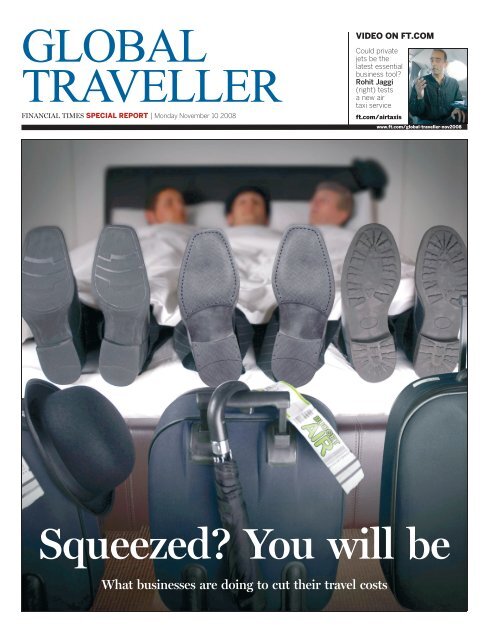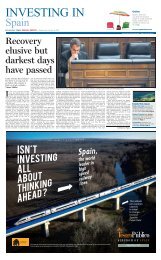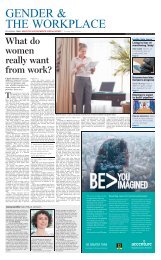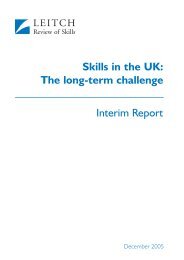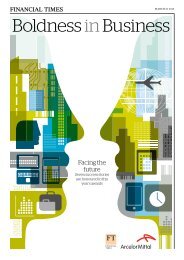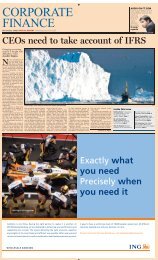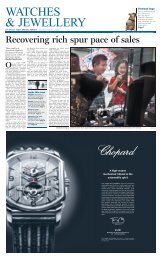What businesses are doing to cut their travel costs - Financial Times ...
What businesses are doing to cut their travel costs - Financial Times ...
What businesses are doing to cut their travel costs - Financial Times ...
You also want an ePaper? Increase the reach of your titles
YUMPU automatically turns print PDFs into web optimized ePapers that Google loves.
GLOBAL<br />
TRAVELLER<br />
FINANCIAL TIMESSPECIALREPORT | MondayNovember 10 2008<br />
Squeezed? You will be<br />
<strong>What</strong> <strong>businesses</strong> <strong>are</strong> <strong>doing</strong> <strong>to</strong> <strong>cut</strong> <strong>their</strong> <strong>travel</strong> <strong>costs</strong><br />
VIDEOONFT.COM<br />
Could private<br />
jets be the<br />
latest essential<br />
business <strong>to</strong>ol?<br />
Rohit Jaggi<br />
(right) tests<br />
a new air<br />
taxi service<br />
ft.com/airtaxis<br />
www.ft.com/global<strong>travel</strong>lernov2008
2 FINANCIALTIMESMONDAYNOVEMBER 10 2008<br />
Global Traveller<br />
IN THIS ISSUE<br />
Soap Box<br />
ALAN PARKER<br />
The chief exe<strong>cut</strong>ive of Whitbread Group<br />
writes that ‘budget’ no longer has <strong>to</strong> mean<br />
‘bad quality’ Page 3<br />
Business Class<br />
AIR TAXIS<br />
Rohit Jaggi finds the arguments for the<br />
business have merit. But will they attract<br />
the required passengers? Page 4<br />
Frequent Traveller<br />
PETER GAGO<br />
The chief winemaker for Penfolds says<br />
preferential treatment for business <strong>travel</strong>lers<br />
is not elitist, just fair Page 5<br />
Business Hubs<br />
LIMA, MUMBAI AND FLORENCE<br />
FT correspondents on grand Peruvian<br />
façades, charming Indian hotels and an<br />
Italian city that breathes culture Pages 67<br />
Wakeup call<br />
Roger Bray looks<br />
at the lengths<br />
companies will go<br />
<strong>to</strong> <strong>cut</strong> <strong>their</strong> <strong>travel</strong><br />
budgets: The Big<br />
S<strong>to</strong>ry Page 8;<br />
Case studies –<br />
Bos<strong>to</strong>n Scientific<br />
and SFR Page 8<br />
CEO Interview<br />
CHRIS CUDDY<br />
Roger Blitz meets the head of Cheapflights,<br />
a price comparison website Page 11<br />
Front Page Illustration: MEESON<br />
Contribu<strong>to</strong>rs<br />
Roger Blitz<br />
Leisure Industries Edi<strong>to</strong>r<br />
Rohit Jaggi<br />
Aviation Columnist<br />
Mark Mulligan<br />
Madrid Correspondent<br />
Naomi Maps<strong>to</strong>ne<br />
Andes Correspondent<br />
James FontanellaKahn<br />
India Edi<strong>to</strong>r, FT.com<br />
Jonathan Soble<br />
Tokyo Correspondent<br />
Jill James, Roger Bray<br />
FT Contribu<strong>to</strong>rs<br />
Seb Mor<strong>to</strong>nClark<br />
Commissioning Edi<strong>to</strong>r<br />
Steven Bird<br />
Designer<br />
Andy Mears<br />
Picture Edi<strong>to</strong>r<br />
For advertising details,<br />
contact:<br />
Jo Bellanca on<br />
tel: +44 (0) 20 7873<br />
3180; fax: + 44 (0) 20<br />
7873 4006,<br />
or email:<br />
josephine.bellanca@ft.com,<br />
or contact your your<br />
usual <strong>Financial</strong> <strong>Times</strong><br />
representative<br />
Travellight:clients<strong>are</strong>planningdaytripsratherthanovernightstays<strong>to</strong>savemoney Corbis<br />
Battle lines drawn as<br />
budgets begin <strong>to</strong> bite<br />
AGENDA<br />
Hotels <strong>are</strong> bracing<br />
for a year of<br />
stiff competition,<br />
writes Roger Blitz<br />
Business <strong>travel</strong>lers<br />
and the hotel industry<br />
have embarked<br />
on a battle royal<br />
over prices as hoteliers fight<br />
<strong>to</strong>oth and nail <strong>to</strong> s<strong>to</strong>p the<br />
economic downturn from<br />
eating in<strong>to</strong> <strong>their</strong> profits and<br />
corporations drive a hard<br />
bargain over room rates.<br />
According <strong>to</strong> some of the<br />
bigger hotel groups, business<br />
<strong>travel</strong>lers hoping <strong>to</strong> see bargains<br />
being thrown <strong>their</strong> way<br />
from hard-pressed hoteliers<br />
during these lean times may<br />
be getting a bit ahead of<br />
themselves. But the mood<br />
among corporate <strong>travel</strong> buyers<br />
is uncompromising and<br />
hotel groups <strong>are</strong> reluctantly<br />
admitting that they <strong>are</strong> in<br />
the early stages of a<br />
prolonged buyers’ market.<br />
No-one in the hotel industry<br />
denies that trade has<br />
started <strong>to</strong> dry up, alarmingly<br />
so in some cases. Rezidor,<br />
the European-based group<br />
that manages Radisson SAS<br />
hotels, last week said it was<br />
<strong>cut</strong>ting <strong>costs</strong> by €20m after<br />
announcing a big slump in<br />
profits.<br />
Marriott, Wyndham and<br />
Accor have all reported<br />
sharp falls in business and<br />
virtually everyone is predicting<br />
a rough ride in 2009. With<br />
companies scything through<br />
<strong>their</strong> <strong>travel</strong> plans, or trading<br />
down, discounted rates<br />
would appear inevitable.<br />
“For 2009, we will see<br />
hotels really looking for business<br />
in a way they have<br />
never had <strong>to</strong> do for a number<br />
of years,” says Nigel Turner<br />
of Carlson WagonlitTravel,<br />
the <strong>travel</strong> management<br />
group. “We will see some<br />
better rates in the marketplace.<br />
A lot of hotels <strong>are</strong><br />
increasingly giving us indications<br />
that they <strong>are</strong> interested<br />
in marketing <strong>to</strong> corporate<br />
business.”<br />
Current discounts average<br />
about 10 per cent, “not a lot,<br />
given the increases in the<br />
last few years”, Mr Turner<br />
says. “But it is the first time<br />
we <strong>are</strong> seeing rates go in the<br />
other direction.”<br />
“Discount” is not a word<br />
that readily comes <strong>to</strong> hoteliers.<br />
Expect <strong>to</strong> hear hotel<br />
groups talk about “value” as<br />
they compete with each<br />
other for the ever-reducing<br />
numbers of business <strong>travel</strong>lers<br />
over the next 12 <strong>to</strong> 18<br />
months. Cutting back on<br />
charges for accessory spending<br />
is one strategy. Those<br />
hotel groups with mid-scale<br />
brands can argue that cus<strong>to</strong>mers<br />
who normally pay<br />
extra for hotel amenities at<br />
upscale hotels will effectively<br />
pay nothing for them when<br />
they trade down.<br />
“The winners will be the<br />
brands that offer exceptional<br />
value and service,” says<br />
Betsy O’Rourke, senior vicepresident<br />
of marketing at the<br />
7,000-hotel Wyndham Worldwide.<br />
“Travellers hate being<br />
nickelled and dimed <strong>to</strong> death<br />
for every service like internet<br />
access, local calls, use of<br />
a business centre or gym.”<br />
To win business, hotel<br />
groups know they have <strong>to</strong><br />
spend marketing dollars, and<br />
the campaigns <strong>are</strong> starting <strong>to</strong><br />
come thick and fast. Inter-<br />
Continental Hotels Group,<br />
for example, because it is<br />
legally obliged <strong>to</strong> spend a<br />
marketing fund made up of<br />
hotel owners’ contributions,<br />
has £800mits disposal.<br />
That will go partly in<strong>to</strong><br />
keeping IHG at the <strong>to</strong>p of<br />
Google’s hotel search page,<br />
plus promotion of Holiday<br />
Inn two-nights-for-one offers,<br />
room upgrades and free<br />
breakfasts. But much of it is<br />
heading for its loyalty club<br />
points system, which has<br />
20m members.<br />
“We <strong>are</strong> certainly looking<br />
from a marketing point of<br />
view <strong>to</strong> increase the way we<br />
promote our loyalty<br />
schemes,” says Leslie<br />
‘The winners will<br />
be the brands that<br />
offer exceptional<br />
value and service’<br />
McGibbon of IHG, which as<br />
well as doubling loyalty<br />
points will also be giving<br />
away wine and baseball merchandise<br />
through the system.<br />
Loyalty schemes have real<br />
traction in the US. Marriott<br />
is tweaking a variety of its<br />
reward programmes, increasing<br />
points bonuses, offering<br />
one night free on a five-night<br />
stay and abolishing “blackout”<br />
dates from January,<br />
thereby enabling members <strong>to</strong><br />
redeem points on any day.<br />
Wyndham is doubling points<br />
for the next two months.<br />
But when it comes <strong>to</strong> cus<strong>to</strong>mers<br />
beyond the US –<br />
where loyalty schemes generate<br />
less interest – and the<br />
all-important corporate<br />
<strong>travel</strong> brokers, pricing decisions<br />
may be the only means<br />
for hotel groups <strong>to</strong> control<br />
the inevitable decline in revenues.<br />
“Points appeal <strong>to</strong> <strong>travel</strong>lers,<br />
but pricing appeals <strong>to</strong><br />
the organisations they work<br />
for,” says Mr Turner. “If they<br />
want <strong>to</strong> hit both people, it’s<br />
got <strong>to</strong> be really on price.”<br />
Hotels and <strong>their</strong> corporate<br />
clients <strong>are</strong> in the midst of<br />
negotiating over 2009 prices.<br />
The anecdotal evidence<br />
shows clients shopping<br />
around more, plotting daytrips<br />
rather than overnight<br />
stays and reducing the<br />
number of hotel suppliers<br />
they use <strong>to</strong> increase economies<br />
of scale.<br />
JW Marriott, chairman of<br />
the hotel group, acknowledged<br />
last week that the outlook<br />
for next year was weakening.<br />
If occupancy drops<br />
further, it plans <strong>to</strong> open up<br />
more discounts on a hotel-byhotel<br />
basis. “Dropping the<br />
corporate benchmark rate is<br />
not something we will be the<br />
first <strong>to</strong> do,” the company<br />
said.<br />
It is not surprising that<br />
corporate <strong>travel</strong> brokers<br />
expect 2009 hotel bills <strong>to</strong> be<br />
considerably cheaper than<br />
those in 2008. “Most of the<br />
markets <strong>are</strong> expecting a<br />
discounting of prices and the<br />
corporate broker will use this<br />
<strong>to</strong> make any rate gain as<br />
little as possible,” says IHG’s<br />
Mr McGibbon.<br />
Did he just say “rate<br />
gain”? Even in this recessionriddled<br />
market, IHG is still<br />
working on the premise that<br />
hotel rates <strong>are</strong> going up.
FINANCIALTIMESMONDAYNOVEMBER 10 2008 3<br />
The biggest challenges of the recession<br />
SoapBox<br />
ALAN PARKER<br />
I was at my old school<br />
recently, talking about the<br />
ups and downs of life as a<br />
chief exe<strong>cut</strong>ive. The events<br />
of the past few months will<br />
certainly provide economics<br />
students with much <strong>to</strong><br />
study. I have seen several<br />
downturns and recessions<br />
and the way in which the<br />
current one has come about<br />
is unprecedented.<br />
Whitbread has weathered<br />
a few s<strong>to</strong>rms in its 260-year<br />
his<strong>to</strong>ry. No longer a brewer,<br />
we have made the business<br />
leaner and more agile so we<br />
can stay focused on what’s<br />
at our core – brands which<br />
represent value for money<br />
for all the family. Yet, there<br />
<strong>are</strong> always lessons <strong>to</strong> be<br />
learned. The biggest is the<br />
need <strong>to</strong> stay relentlessly<br />
focused on value, and on<br />
the cus<strong>to</strong>mer. And the<br />
challenge is <strong>to</strong> do this<br />
without compromising on<br />
sustainability. The corporate<br />
landscape may well look<br />
very different in a few<br />
years’ time, but those who<br />
can adapt quickly <strong>to</strong> the<br />
changing times will prove<br />
the most resilient – and may<br />
even emerge stronger.<br />
This may not sound<br />
surprising. We have seen a<br />
huge growth in “budget”<br />
consumption over the last<br />
few years. Although this is<br />
nothing new – supermarkets<br />
created “Value” ranges as a<br />
response <strong>to</strong> the last<br />
recession – the public has<br />
become increasingly savvy<br />
at finding great deals when<br />
it comes <strong>to</strong> booking hotel<br />
rooms, eating out and<br />
buying food. And the<br />
market has adapted and<br />
grown <strong>to</strong> meet this appetite.<br />
This is clear from the<br />
phenomenal growth seen by<br />
the budget hotel sec<strong>to</strong>r in<br />
recent years. The number of<br />
rooms has more than<br />
doubled, from 40,000 <strong>to</strong><br />
90,000, in the UK since 2000<br />
alone. Indeed, the sec<strong>to</strong>r<br />
now accounts for two-thirds<br />
of the annual growth within<br />
the UK hospitality industry.<br />
<strong>What</strong>’s more, occupancy and<br />
revenues <strong>are</strong> growing fastest<br />
at the budget end of the<br />
market.<br />
The budget hotel in its<br />
current form is a relatively<br />
new phenomenon. The<br />
sec<strong>to</strong>r certainly did not exist<br />
back in 1992, when we last<br />
saw a prolonged consumer<br />
recession. There were<br />
merely a large number of<br />
unbranded and unconnected<br />
independent hotels across<br />
the country. Since then, we<br />
have seen the emergence of<br />
a few major players,<br />
Whitbread’s Premier Inn<br />
being the leader in the<br />
overall UK hotel market.<br />
The branded budget hotel<br />
model provides the leisure<br />
and business <strong>travel</strong>ler with<br />
a cle<strong>are</strong>r choice when<br />
booking accommodation. It<br />
also gives them a more<br />
comfortable stay.<br />
“Budget” no longer has <strong>to</strong><br />
mean “bad quality”. <strong>What</strong><br />
may be surprising, however,<br />
is that I believe the sec<strong>to</strong>r<br />
has the potential <strong>to</strong><br />
continue growing, despite<br />
the current challenging<br />
economic conditions.<br />
Like-for-like sales at Premier<br />
Inn rose 10 per cent in the<br />
first half, with revenue per<br />
available room (a common<br />
metric used in the hotel<br />
industry) up by more than<br />
6 per cent. The branded<br />
budget market is still<br />
relatively under-represented<br />
in the UK, with a 13 per<br />
cent sh<strong>are</strong> comp<strong>are</strong>d <strong>to</strong><br />
23 per cent in France and<br />
25 per cent in the US, both<br />
more established markets.<br />
There is clearly room for<br />
more. That said, even in a<br />
growth phase, just like our<br />
cus<strong>to</strong>mers, we must keep<br />
strict controls on <strong>costs</strong>.<br />
Other <strong>businesses</strong> <strong>are</strong><br />
<strong>doing</strong> the same. We <strong>are</strong><br />
seeing a significant increase<br />
in corporate cus<strong>to</strong>mers.<br />
Under pressure <strong>to</strong> <strong>cut</strong> <strong>costs</strong>,<br />
The more the<br />
hospitality industry<br />
can do <strong>to</strong> promote<br />
itself as great<br />
value, the more<br />
likely we <strong>are</strong> <strong>to</strong><br />
emerge stronger<br />
companies <strong>are</strong> recognising<br />
the value-for-money,<br />
guaranteed standards in a<br />
£50 room over a £100<br />
four-star room. “Trading<br />
down” doesn’t have <strong>to</strong> mean<br />
settling for something<br />
cheaper either, just buying<br />
smarter. Premier Inn<br />
attracted more than 1,800<br />
new companies <strong>to</strong> its<br />
Business Account scheme in<br />
the first half of this year, an<br />
increase of 16 per cent<br />
taking the <strong>to</strong>tal <strong>to</strong> 13,000<br />
<strong>businesses</strong>.<br />
Those who specialise in<br />
giving cus<strong>to</strong>mers great<br />
value will have the edge.<br />
We’re all working harder<br />
than ever, but we still need<br />
<strong>to</strong> eat and sleep and relax.<br />
We shouldn’t have <strong>to</strong> s<strong>to</strong>p<br />
the lifestyle we have,<br />
instead, we have the choice<br />
<strong>to</strong> prioritise differently. We<br />
know people still want <strong>to</strong><br />
eat out, so we have looked<br />
hard at our restaurant<br />
business and have refreshed<br />
our menus with more<br />
emphasis on the value<br />
proposition, on lower-cost<br />
dishes and on attractive<br />
food offers (such as two<br />
meals for £9 at Brewers<br />
Fayre). Price flexibility is<br />
crucial in times like these.<br />
Perhaps the recession’s<br />
biggest challenge, a lesson<br />
we all need <strong>to</strong> learn, is how<br />
we can continue <strong>to</strong> give<br />
cus<strong>to</strong>mers great value, but<br />
do it more sustainably. We<br />
cannot let these times serve<br />
as an excuse <strong>to</strong> let slip our<br />
responsibilities <strong>to</strong>wards the<br />
environment. The industry<br />
needs <strong>to</strong> be sensitive <strong>to</strong><br />
these challenges and<br />
continue <strong>to</strong> adapt<br />
accordingly. The 2012<br />
Olympics will bring millions<br />
of people <strong>to</strong> the UK. The<br />
more the hospitality<br />
industry can do <strong>to</strong> promote<br />
itself as great value, with no<br />
compromise in quality and<br />
sustainable practices, the<br />
more likely we <strong>are</strong> <strong>to</strong><br />
emerge stronger than before.<br />
Alan Parker, CBE, is chief<br />
exe<strong>cut</strong>ive of Whitbread<br />
Group plc<br />
Global Traveller<br />
‘‘Budget’nolongerhas<strong>to</strong>mean‘badquality’’ Charlie Bibby
4 FINANCIALTIMESMONDAYNOVEMBER 10 2008<br />
Global Traveller<br />
Volume issue<br />
hoversoverair<br />
taxi startups<br />
BUSINESSCLASS<br />
European newcomers<br />
will be banking on<br />
high utilisation rates,<br />
reports Rohit Jaggi<br />
The concept of air taxis has<br />
not got off <strong>to</strong> a flying start.<br />
The US service that had<br />
the biggest ambitions,<br />
DayJet of Florida, had those lofty<br />
plans brought crashing down <strong>to</strong><br />
earth by the credit crunch and<br />
delays in aircraft deliveries. Of the<br />
1,400 Eclipse 500 very light jets<br />
(VLJs) it envisaged operating, the<br />
28 it actually received <strong>are</strong> now<br />
being sold on by the manufacturer.<br />
In western Europe, conditions <strong>are</strong><br />
different. While roads <strong>are</strong> more congested,<br />
there <strong>are</strong> more options for<br />
point-<strong>to</strong>-point <strong>travel</strong>, including fast<br />
rail services. And some, including<br />
the body responsible for air traffic<br />
control in Europe, fear the system<br />
will not be able <strong>to</strong> cope with sizeable<br />
fleets of four-passenger, twinturbofan<br />
air taxis.<br />
Meanwhile, the rapid deteriora-<br />
‘The timing for us is<br />
quite an opportunity<br />
...If the cycle follows<br />
the usual trends in the<br />
world, we’ll be launching<br />
in the upcycle’<br />
tion in the financial climate has put<br />
a squeeze on conspicuous consumption<br />
of private aviation services.<br />
One large opera<strong>to</strong>r calls the current<br />
sudden slowing in business jet<br />
traffic a “pregnant pause”.<br />
But others say the situation<br />
demands that companies pursue<br />
opportunities more aggressively,<br />
and focus more clearly on choosing<br />
<strong>travel</strong> options that <strong>are</strong> efficient not<br />
just in cost but also in time.<br />
There is also evidence owners of<br />
large business jets <strong>are</strong> willing <strong>to</strong><br />
slum it in an air taxi for shorter<br />
hops, because the cost is more easy<br />
<strong>to</strong> justify. In addition, commercial<br />
airline schedules do not often lend<br />
themselves <strong>to</strong> multi-sec<strong>to</strong>r trips in<br />
a single day.<br />
Blink, one of the first European<br />
start-ups <strong>to</strong> use the air taxi model,<br />
is confident. It says its decision <strong>to</strong><br />
go with a per-plane hire basis,<br />
rather than the per-seat model that<br />
DayJet was so confident would succeed,<br />
gives it an edge. But at the<br />
same time that model puts it close<br />
<strong>to</strong> the traditional private charter.<br />
Where the two models differ is<br />
that the air taxi start-ups hope <strong>to</strong><br />
offer lower prices by achieving<br />
higher utilisation rates of <strong>their</strong><br />
expensive assets – the aircraft.<br />
Established charter companies<br />
expect <strong>to</strong> have <strong>their</strong> aircraft flying<br />
for about 400 hours a year. Blink is<br />
aiming at more like 800.<br />
The Farnborough-based company<br />
started operations in June, and has<br />
been operating with only one aircraft<br />
since. “It’s still very early,”<br />
says Peter Leiman, Blink managing<br />
direc<strong>to</strong>r. “With one plane we can’t<br />
draw any definitive conclusions.<br />
But, that being said, in September<br />
we achieved a utilisation rate that<br />
on an annualised basis would be<br />
840 hours a year.”<br />
Blink has opted for a single plane<br />
from an established manufacturer –<br />
the four-passenger Citation Mustang,<br />
from Kansas-based Cessna.<br />
There have been none of the delays<br />
and technical issues that still afflict<br />
the Eclipse, the aircraft that the<br />
now-defunct DayJet chose, according<br />
<strong>to</strong> Mr Leiman.<br />
Two additional Mustangs arrive<br />
this month, then on average one<br />
more a month will be added <strong>to</strong> the<br />
fleet over the next two years.<br />
The Phenom 100, another new<br />
aircraft from an established manufacturer,<br />
has been chosen by<br />
JetBird, which plans <strong>to</strong> launch next<br />
year from Germany. It has 56 firm<br />
orders and 44 options for the fourpassenger<br />
Phenom, made by<br />
Embraer of Brazil. JetBird expects<br />
its first aircraft in April with, on<br />
average, two more a month <strong>to</strong> 2013.<br />
Stefan Vilner, JetBird chief exe<strong>cut</strong>ive,<br />
is unfazed by the current economic<br />
woes. “The timing for us is<br />
quite an opportunity,” he says. “We<br />
<strong>are</strong> going <strong>to</strong> launch quietly in 2Q<br />
2009. If the cycle follows the usual<br />
trends in the world, we’ll be<br />
launching in the upcycle.”<br />
According <strong>to</strong> Domhnal Slattery,<br />
JetBird founder: “From an equity<br />
perspective, the balance sheet is<br />
very healthy. We completed all of<br />
our equity financing before the dislocation<br />
in the markets.”<br />
Financing for the start-up phase<br />
is key. “Forty <strong>to</strong> 50 aircraft <strong>are</strong><br />
required for economies of scale,”<br />
says Mr Slattery. “We assume we’ll<br />
get <strong>to</strong> critical mass in 2011.”<br />
Mr Leiman says signs support the<br />
idea that air taxis could expand the<br />
whole market. “Some 60 per cent of<br />
our cus<strong>to</strong>mers <strong>are</strong> private-jet-down<br />
users,” he says. “But 40 per cent<br />
<strong>are</strong> new <strong>to</strong> private aviation.”<br />
Some analysts <strong>are</strong> not convinced.<br />
“The last time I looked you need<br />
utilisation rates of at least 1,000<br />
hours a year,” says Chris Tarry,<br />
who runs aviation consultancy<br />
CTAIRA. The arguments for air<br />
taxis, he says, “clearly have merit.<br />
But <strong>are</strong> they going <strong>to</strong> have the<br />
volume?”<br />
VIDEO ON FT.COM<br />
Rohit Jaggi puts the air taxi service <strong>to</strong><br />
the test and looks at the vulnerability<br />
of the private jet sec<strong>to</strong>r in a downturn<br />
www.ft.com/airtaxis<br />
Offthebeatentrack:airtaxiscanput<strong>travel</strong>lersin<strong>to</strong>smallerairfieldscloser<strong>to</strong><strong>their</strong>destination Ben Stansall<br />
Pricecomparisonshowshowtheairtaxisf<strong>are</strong><br />
Air taxi opera<strong>to</strong>rs, whether in business already or<br />
about <strong>to</strong> be, push the idea that using <strong>their</strong> services<br />
can permit greater efficiency by allowing more<br />
meetings <strong>to</strong> be squeezed in<strong>to</strong> one day, especially in<br />
places illserved by the airlines. Saving time by<br />
avoiding long checkin and security queues when using<br />
smaller airports is another bonus.<br />
But they also claim these benefits come at an<br />
attractive price. UKbased Blink says that if all four<br />
passenger seats in its Cessna Citation Mustangs <strong>are</strong><br />
filled, the cost is within 20 per cent, up or down, of<br />
businessclass f<strong>are</strong>s on scheduled airlines.<br />
JetBird, due <strong>to</strong> launch from Germany next year, is<br />
not giving away pricing details. But Domhnal Slattery,<br />
its chairman, says f<strong>are</strong>s will be “50 per cent lower<br />
than current incumbent legacy players among the big<br />
charter companies”. That claim is echoed by Blink.<br />
To test the pricing model, I asked Blink <strong>to</strong> quote for<br />
a flight <strong>to</strong>day from London <strong>to</strong> Paris <strong>to</strong> Stuttgart <strong>to</strong><br />
Antwerp and back <strong>to</strong> London. Blink’s price, including<br />
all landing fees, was £5,049. A <strong>to</strong>tal flying time of less<br />
than four hours would leave ample time for meetings<br />
in all the destinations.<br />
British Airways, when asked for f<strong>are</strong>s <strong>to</strong> cover this<br />
flight, was flummoxed. I could leave London early this<br />
morning, and get <strong>to</strong> Stuttgart, but the BA person was<br />
unable <strong>to</strong> find a way of getting me from Stuttgart <strong>to</strong><br />
Antwerp. “You’re going <strong>to</strong> need <strong>to</strong> get in <strong>to</strong>uch with a<br />
private jet charter company for this,” he said,<br />
unprompted. “You need a Lear jet, that’s what you<br />
need.”<br />
The best BA could find in a business class, fully<br />
flexible f<strong>are</strong> would not get me back <strong>to</strong> London from<br />
Amsterdam until <strong>to</strong>morrow. It would also cost £1,199<br />
per person. “And that’s missing a bit in the middle,”<br />
as the goodhumoured BA fellow put it.<br />
A second attempt with BA got me <strong>to</strong> Brussels via<br />
Lufthansa late in the day, after a long s<strong>to</strong>p in<br />
Stuttgart. Catching the last flight <strong>to</strong> London left no<br />
time <strong>to</strong> do anything more than sprint between aircraft.<br />
As an alternative, I was offered a £120 fourstar<br />
hotel room, and a first flight <strong>to</strong> London in the<br />
morning. Either way, the cost in f<strong>are</strong>s and taxes was<br />
in the region of £1,190 per person. That comes <strong>to</strong><br />
£4,760 for the same number of passengers you can<br />
fit in<strong>to</strong> your own Mustang,<br />
The Air France office was thrown in<strong>to</strong> confusion by<br />
my request. Much putting on hold while people in the<br />
office conferred, and a few false conclusions later, Air<br />
France came up with a route that covered all the<br />
ground – <strong>to</strong> Brussels though not <strong>to</strong> Antwerp – but<br />
would keep me out of London until Wednesday<br />
evening, the 12th. At a businessclass cost of £1,130<br />
per person, or £4,520 for four seats.<br />
But another fac<strong>to</strong>r may upset the pricing equation.<br />
According <strong>to</strong> aviation analyst Chris Tarry, f<strong>are</strong>s on<br />
regular airlines <strong>are</strong> falling swiftly.<br />
Quotes for the same route from other aviation<br />
opera<strong>to</strong>rs included £7,000 allin using a Mustang, the<br />
same aircraft as Blink’s, from air charter broker<br />
Oxygen 4. The broker also quoted £9,000 using a<br />
Learjet 45 superlight aircraft, and £14,000 for a<br />
Cessna Citation Sovereign super midsize jet.<br />
Business aviation specialist ExecuJet, meanwhile,<br />
quoted €17,200 (£13,890) for the route in a Learjet<br />
60, which can take six passengers.<br />
To put all that in context, a flight from London <strong>to</strong><br />
Larnaca in Cyprus, taking about the same time as the<br />
<strong>to</strong>tal for the fourleg trip quoted above, would cost a<br />
NetJets cus<strong>to</strong>mer about €18,700 on a Hawker 800.<br />
The Blink f<strong>are</strong> is close <strong>to</strong> that for four airline<br />
businessclass seats – and enables a more efficient<br />
day. But the average number of passengers on a<br />
business jet flight is only two – booking a Blink<br />
Mustang and putting only two people on it would give<br />
a very different complexion <strong>to</strong> the comparison.<br />
Rohit Jaggi<br />
Highlevel:RohitJaggiinBlink’sMustang Ben Stansall
FINANCIALTIMESMONDAYNOVEMBER 10 2008 5<br />
Global Traveller<br />
Fullbodybubblesbestat35,000ft<br />
FREQUENTTRAVELLER<br />
PETERGAGO<br />
Chief winemaker<br />
for Penfolds talks<br />
<strong>to</strong> Jill James<br />
For a winemaker, Newcastleborn<br />
Peter Gago drinks an<br />
awful lot of water. But since<br />
he spends so much time in<br />
an aircraft cabin then it may<br />
not be such a surprise.<br />
“I drink plenty of water <strong>to</strong><br />
counteract cabin air-conditioning<br />
systems,” he says.<br />
“But drinking my own company’s<br />
wine is now a <strong>to</strong>uch<br />
more complicated as airlines<br />
will only let you on with less<br />
than 100ml of any liquid.”<br />
Bottles that he invariably<br />
has <strong>to</strong> bring on his <strong>travel</strong>s<br />
<strong>are</strong> safely s<strong>to</strong>wed in the hold<br />
with the rest of his baggage.<br />
As chief winemaker for Penfolds,<br />
one of Australia’s better-known<br />
wine producers,<br />
Melbourne-raised Mr Gago<br />
inhabits a truly global world.<br />
“But one that needs <strong>to</strong> be<br />
diligently serviced,” he maintains.<br />
He is more than happy <strong>to</strong><br />
talk about wine with anyone<br />
and it is surely his communication<br />
skills that help make<br />
Penfolds Wine Recorking<br />
Clinics so popular. You may<br />
think these events <strong>are</strong> the<br />
‘If you’re <strong>travel</strong>ling<br />
on business you<br />
should get some<br />
priority – this isn’t<br />
an elitist thing,<br />
it’s functional’<br />
province of a wealthy few<br />
who just want <strong>to</strong> make sure<br />
<strong>their</strong> wine assets <strong>are</strong> safe −<br />
but you would be wrong.<br />
“We do get wealthy collec<strong>to</strong>rs<br />
of course,” he says. “But<br />
there’s a healthy mix from<br />
across the world, a broad<br />
spectrum from mums and<br />
dads, young and old, corporate<br />
buyers, anyone and everyone<br />
– people interested in<br />
finding out more about wine<br />
and looking after it.”<br />
Since 1991, he believes, the<br />
Penfolds team has recorked<br />
95,000 bottles of wine, 15<br />
years and older, worldwide.<br />
And, in case you <strong>are</strong> wondering<br />
why anyone should go<br />
<strong>to</strong> that trouble, you need<br />
only look at the prices that<br />
Penfolds charges for its <strong>to</strong>p<br />
vintages. Its famous Grange<br />
and other Special Bin wines<br />
retail on release for more<br />
than £150 a bottle.<br />
Australia’s winemakers <strong>are</strong><br />
more peripatetic than most.<br />
A high level of exports has<br />
much <strong>to</strong> do with this. In the<br />
case of Mr Gago’s company,<br />
two out of every three bottles<br />
leave Australia.<br />
Which is why New York,<br />
Miami, Chicago, Hous<strong>to</strong>n,<br />
San Francisco, Toron<strong>to</strong>,<br />
Hong Kong, Singapore, Welling<strong>to</strong>n,<br />
Zurich, Munich and,<br />
of course London, <strong>are</strong> just<br />
some of the places <strong>to</strong> which<br />
Mr Gago and his team have<br />
taken the recorking clinics in<br />
the past few years.<br />
Athough he can be anywhere<br />
in the world in almost<br />
any season, the time of the<br />
Australian vintage is a complete<br />
no-fly zone. From February<br />
<strong>to</strong> May, he spends time<br />
in the winery and visiting<br />
his vineyards, from Coonawarra,<br />
Robe, Wrat<strong>to</strong>nbully<br />
and Padthaway in Australia’s<br />
south-east <strong>to</strong><br />
McL<strong>are</strong>n Vale, Barossa Valley,<br />
Adelaide Hills and Eden<br />
Valley.<br />
As a <strong>travel</strong>ler with so<br />
much mileage on the clock,<br />
the Adelaide-based oenophile<br />
is very conscious of his carbon<br />
footprint – he does his<br />
best <strong>to</strong> offset – and points <strong>to</strong><br />
the environmental policies<br />
his company has put – and is<br />
putting – in place. This is<br />
just as well since Gail, his<br />
wife, is a South Australian<br />
government minister and<br />
recent holder of the environment<br />
portfolio.<br />
His <strong>travel</strong>s also bring a<br />
heavy workload. “We seem<br />
<strong>to</strong> work more and more<br />
seven day weeks really,” he<br />
says. “I work in the air as<br />
long as possible on emails,<br />
reports, catching up . . . ”<br />
In September, he flew<br />
direct from Sydney <strong>to</strong> Vancouver<br />
with Air Canada. “If I<br />
can avoid the unknown<br />
potential delays of US cus<strong>to</strong>ms<br />
and immigration, then I<br />
will,” he says.<br />
Qantas is his airline of<br />
preference and his card privileges<br />
mean he takes advantage<br />
of all that business class<br />
and the occasional upgrade<br />
have <strong>to</strong> offer, from fine wines<br />
<strong>to</strong> good-quality lounges.<br />
Curious <strong>to</strong> know what a<br />
winemaker drinks when he<br />
is flying? He says: “At<br />
35,000ft I go for the bigger,<br />
fuller-bodied names in Champagne,”<br />
he says. “Bollinger<br />
and Krug – if ever on offer.<br />
Complex and fuller-flavoured,<br />
multilayered styles.”<br />
He nearly always has a<br />
glass of Champagne on takeoff<br />
and a glass of wine with<br />
his meal. “I treat the wine<br />
choice in the same way as I<br />
would if I were in a restaurant.”<br />
Good airlines take in<strong>to</strong><br />
account the real needs of<br />
business <strong>travel</strong>lers, he says,<br />
adding: “It doesn’t matter<br />
what your class of <strong>travel</strong> –<br />
first, business or economy –<br />
if you’re <strong>travel</strong>ling on business<br />
you should get some priority<br />
– whether it’s queuing<br />
less or being called at a later<br />
time for a flight. This isn’t an<br />
elitist thing, it’s functional.<br />
When I’m <strong>travel</strong>ling on holiday<br />
I don’t have deadlines<br />
and in a more relaxed way I<br />
can spend extra time, if necessary,<br />
at the airport. Busi-<br />
ness <strong>travel</strong>lers <strong>are</strong> always<br />
under a different set of time<br />
pressures.”<br />
When the FT caught up<br />
with him in London he was<br />
staying at one of his favourite<br />
hotels, the small and comfortable<br />
Capital, in Basil<br />
Street.<br />
Its appeal – apart from the<br />
Michelin-starred cooking of<br />
Eric Chavot – is its service,<br />
friendliness and understated<br />
luxury, says Mr Gago. He<br />
likes boutique hotels and<br />
mentioned the Hotel Gansevoort<br />
in New York’s meat<br />
packing district as another<br />
favourite.<br />
“But, hey, if someone else<br />
is paying I’ll happily stay at<br />
the St Regis.”<br />
One of the snags of <strong>travel</strong>,<br />
he says, is spending so much<br />
time away from home. “But<br />
in some ways at times it’s<br />
fortunate that Gail, my wife,<br />
is incredibly busy because of<br />
her job – I get away with a<br />
little more absence than I<br />
might otherwise.”<br />
He muses: “Jet-lag seems<br />
<strong>to</strong> catch up with me more as<br />
I get older, I’m now 51, and it<br />
seems such a random thing. I<br />
guess that and the massive<br />
waste of time spent in<br />
queues and on tarmac <strong>are</strong><br />
the real downsides of <strong>travel</strong>.”<br />
Tasteful:PeterGago
6 FINANCIALTIMESMONDAYNOVEMBER 10 2008<br />
Global Traveller<br />
Ancient cities<br />
still tantalise<br />
modern guests<br />
BUSINESSHUBS<br />
FT writers offer<br />
<strong>their</strong> tips on three<br />
key destinations<br />
Lima<br />
How <strong>to</strong> get there<br />
Most visi<strong>to</strong>rs arrive at Lima’s<br />
sparkling Jorge Chavez terminal<br />
in Callao, which in<br />
good traffic is a 40-minute<br />
drive from the seaside district<br />
of Miraflores (more than<br />
an hour at peak times). Travellers<br />
from Europe will have<br />
<strong>to</strong> connect in the US, where<br />
LAN and American Airlines<br />
have direct flights. It’s not<br />
advisable <strong>to</strong> take taxis from<br />
<strong>to</strong>uts, but taxi remisse services<br />
within the terminal <strong>are</strong><br />
good, though expensive. If<br />
you can ring ahead, local<br />
companies such as Taxi Full<br />
Service (+511 0125711311) and<br />
Taxi Seguro (+511 415 2525)<br />
<strong>are</strong> reliable. A hint for <strong>travel</strong>lers<br />
returning home: get <strong>to</strong><br />
your departure gate as soon<br />
as possible after checking in.<br />
You will need <strong>to</strong> queue three<br />
times – once <strong>to</strong> pay a departure<br />
tax, a second time for<br />
security checks, and a third<br />
for immigration.<br />
Where <strong>to</strong> stay<br />
While Lima’s colonial centre<br />
has some lovely squ<strong>are</strong>s and<br />
grand façades, many choose<br />
<strong>to</strong> base themselves by the<br />
ocean in Miraflores or San<br />
Isidro. Miraflores Park Hotel<br />
and the Marriott offer fivestar<br />
service and roof<strong>to</strong>p<br />
pools, as well as unbroken<br />
views of the Pacific and of<br />
the colourful flocks of parasailors.<br />
In San Isidro, Swissotel<br />
Lima and Sonesta Posada<br />
del Inca El Olivar <strong>are</strong> conveniently<br />
located.<br />
Where <strong>to</strong> eat<br />
This is the key question in<br />
Lima, a city rightly proud of<br />
its cuisine – a melange of<br />
Peruvian, Spanish, African,<br />
Chinese, Japanese and Moorish<br />
influences. If you learn<br />
only one Spanish phrase during<br />
your visit, make it “Que<br />
rico!” or “How delicious!”<br />
The city has thousands of<br />
hole-in-the-wall eateries<br />
where it is possible <strong>to</strong> get a<br />
menu of the day for 10 new<br />
sol ($3.30) or less, which will<br />
normally include a glass of<br />
chicha morada (sweet juice of<br />
purple maize), ceviche (fish<br />
marinated in lime juice and<br />
spices with a garnish of<br />
sweet pota<strong>to</strong>, corn and sliced<br />
Spanish onions), a main dish<br />
such as aji de gallina (a type<br />
of chicken stew with yellow<br />
pepper) or arroz con pa<strong>to</strong><br />
(roast duck in a coriander<br />
sauce with rice) and a pudding.<br />
For the best criollo<br />
cooking, head <strong>to</strong> El Rincón<br />
que no Conoces, where Ter-<br />
ExplorethecatacombsofLima’sSanFranciscoChurch Alamy<br />
esa Izquierdo has been presiding<br />
over the kitchen for 31<br />
years. To hang with Lima’s<br />
smart set, book a lunchtime<br />
table (many of the best seafood<br />
restaurants <strong>are</strong> not open<br />
for dinner) at La Mar, the<br />
excellent cevicheria founded<br />
by celebrity chef Gastón Acurio,<br />
or the nearby Pescados<br />
Capitales. Its dishes <strong>are</strong><br />
named after various deadly<br />
sins, including – aptly – glut<strong>to</strong>ny,<br />
and if you pay close<br />
attention <strong>to</strong> the menu of the<br />
day you may find evidence of<br />
the latest political scandal –<br />
a recent menu featured “Los<br />
Aceitados” (the bribes) and<br />
“Yehude”, a tribute <strong>to</strong> the<br />
newly sworn-in prime minister,<br />
Yehude Simon, after a<br />
hasty cabinet reshuffle.<br />
For <strong>to</strong>p Peruvian modern<br />
“fusion” food, try Astrid y<br />
Gastón or relative newcomer<br />
Hervé – a chic bistro that<br />
blends French technique<br />
with local ingredients. For a<br />
passionfruit pisco sour or a<br />
meal with a view, try La<br />
Rosa Nautica, which sits on<br />
a lovely wooden pier over the<br />
Pacific amid the breaking<br />
waves, or Huaca Pucllana, at<br />
the base of a centuries-old<br />
pyramid in the heart of Miraflores.<br />
<strong>What</strong> <strong>to</strong> do<br />
Lima was the Spanish centre<br />
of the Americas from 1535 <strong>to</strong><br />
the early 19th century. It was<br />
levelled by an earthquake in<br />
1746, but nine years later, the<br />
cathedral that now stands in<br />
the World Heritage listed<br />
Plaza de Armas in central<br />
Lima rose from the rubble –<br />
a reconstruction of the original.<br />
Combine a visit <strong>to</strong> the<br />
cathedral <strong>to</strong> see the chapel<br />
said <strong>to</strong> house the remains of<br />
the explorer Francisco Pizarro<br />
with a trip <strong>to</strong> the nearby<br />
San Francisco Church for a<br />
guided <strong>to</strong>ur of catacombs<br />
where thousands of skeletal<br />
remains <strong>are</strong> laid out.<br />
The legacy of the Inca and<br />
Moche civilisations can be<br />
felt everywhere in Peru, but<br />
the presence of the Huaca<br />
Pucllana pyramid amid the<br />
suburban homes of Miraflores<br />
is especially arresting.<br />
If you have a day <strong>to</strong> sp<strong>are</strong>,<br />
you might also consider a<br />
trip <strong>to</strong> Pachacmac, a vast<br />
ancient ceremonial complex<br />
south of Lima, or Caral, a<br />
valley of pyramids linked <strong>to</strong><br />
a pre-Incan society from 5,000<br />
years ago (a three-and-a-halfhour<br />
drive from Lima each<br />
way).<br />
Back in Miraflores, take a<br />
Reservedaseat?CommutertrainsarriveatChurchgatestationinMumbaiduringrushhour<br />
walk along the cliff-<strong>to</strong>ps <strong>to</strong><br />
the Love Park. If you’re not<br />
sc<strong>are</strong>d of heights, strap yourself<br />
in with a parapente<br />
instruc<strong>to</strong>r at the park next<br />
door and fly along the<br />
cliff<strong>to</strong>ps in either direction.<br />
On the beach below, you can<br />
rent boards and wetsuits and<br />
take a surfing lesson for 50<br />
new sols.<br />
The markets in Petit<br />
Thoars, Miraflores, offer<br />
goods from all over the country<br />
– alpaca scarves and ponchos,<br />
textiles, ceramics and<br />
paintings.<br />
A smaller night market in<br />
Parque Central de Miraflores<br />
offers a similar selection,<br />
with the added benefit of<br />
being close <strong>to</strong> good cafes and<br />
regular free evening concerts<br />
of Afro-Peruvian and other<br />
local music.<br />
Naomi Maps<strong>to</strong>ne<br />
Mumbai<br />
How <strong>to</strong> get there<br />
Mumbai may be India’s<br />
financial capital but Chhatrapati<br />
Shivaji International<br />
Airport (CSIA) will not<br />
impress you: it’s dirty, congested,<br />
and still under construction.<br />
CSIA is in north Mumbai,<br />
about 35km from the south,<br />
where most business meetings<br />
and conferences <strong>are</strong><br />
held. Travelling by taxi can<br />
be extremely challenging, as<br />
roads <strong>are</strong> constantly jammed<br />
and full of potholes – a sign<br />
of the cities dire infrastructural<br />
conditions. A trip from<br />
CSIA <strong>to</strong> the south can take<br />
anywhere between 45 minutes<br />
and 3 hours. To avoid<br />
the onslaught of taxi drivers<br />
offering <strong>their</strong> services, organise<br />
someone <strong>to</strong> pick you up<br />
at the airport. All big fivestar<br />
hotels can arrange for a<br />
driver with an air-conditioned<br />
car, which is a must<br />
for any business <strong>travel</strong>ler.<br />
Although local cab drivers<br />
<strong>are</strong> very friendly and they<br />
tend <strong>to</strong> stick <strong>to</strong> the meter,<br />
the black and yellow 1950s<br />
Fiat cabs tend <strong>to</strong> flood the<br />
senses with pollution, stifling<br />
heat and pungent smells.<br />
Where <strong>to</strong> stay<br />
You can find a good selection<br />
of luxury hotels close <strong>to</strong> the<br />
financial district in Nariman<br />
point, south Mumbai. A<br />
favourite is the charming<br />
100-year-old Taj Mahal,<br />
which overlooks the harbour<br />
and the Gateway of India –<br />
one of the city’s most popular<br />
<strong>to</strong>urist sites. If it is fully<br />
booked, try the Oberoi or the<br />
Intercontinental on Marine<br />
Drive, where you will find<br />
breathtaking views of the<br />
Arabian Sea.<br />
In the north, around Bandra<br />
Kurla, which is Mumbai’s<br />
version of London’s<br />
Canary Wharf, you can stay<br />
in the characteristic ITC<br />
Grand Maratha Shera<strong>to</strong>n, or<br />
there is the more standard-<br />
Hayatt and the Marriott fivestar<br />
hotels. However, if you<br />
<strong>are</strong> staying here, do not<br />
expect <strong>to</strong> go for a walk after<br />
dinner – you will be surrounded<br />
by construction<br />
sites and stray dogs.<br />
If you plan <strong>to</strong> stay for long<br />
periods you can opt for a<br />
serviced apartment at the<br />
Taj Mews Luxury Residence<br />
in south Mumbai, next door<br />
<strong>to</strong> the Anil Ambani, the<br />
world’s sixth richest man,<br />
according <strong>to</strong> Forbes.<br />
Where <strong>to</strong> eat<br />
Mumbai offers the best selection<br />
of international food in<br />
India. Top of the list is<br />
Indigo, in Colaba, behind the<br />
Taj Mahal hotel, which<br />
serves a great Italian champagne<br />
risot<strong>to</strong> and seafood<br />
spaghetti. If you <strong>are</strong> in <strong>to</strong>wn<br />
over the weekend, try the<br />
Sunday brunch, which offers<br />
a mixture of continental<br />
starters, one main course, a<br />
selection of desserts and a<br />
“drink as much as you can”<br />
offer, which includes local<br />
champagne (or sparkling<br />
wine) Sulla and cocktails, all<br />
for Rs2000 (about $40).<br />
For seafood go <strong>to</strong> Trishna<br />
in Kala Ghoda, in the Fort<br />
<strong>are</strong>a of South Mumbai. The<br />
fish is fresh and when it<br />
comes <strong>to</strong> lobster you can<br />
pick what you eat. Avoid fish<br />
during the monsoon season<br />
(mid-June <strong>to</strong> the end of September),<br />
as fishing boats<br />
remain docked in the har-
FINANCIALTIMESMONDAYNOVEMBER 10 2008 7<br />
bour. For Indian food try<br />
Khyber, with <strong>their</strong> Mughalera<br />
dishes, which includes<br />
spicy curries and succulent<br />
kebabs. Khyber has two<br />
branches, one in the south,<br />
on Mahatma Gandhi Road in<br />
Fort, and a more recent additiona<br />
in Khar, in the north.<br />
If you <strong>are</strong> flying out of<br />
Mumbai, which means your<br />
flight will leave late at night,<br />
have dinner at Peshawari at<br />
the Shera<strong>to</strong>n, which is close<br />
<strong>to</strong> the airport. The sikandari<br />
raan, a slowly baked mut<strong>to</strong>n<br />
dish, and a rich Dal Makhani<br />
(dark lentils), <strong>are</strong> a must.<br />
<strong>What</strong> <strong>to</strong> do<br />
Enjoy a drink at the Inter-<br />
Continental’s Dome bar,<br />
which is on the roof<strong>to</strong>p of the<br />
five-star hotel, overlooking<br />
the Arabian sea. The place<br />
will give you a chance <strong>to</strong><br />
enjoy a beer away from the<br />
hustle and bustle of Mumbai’s<br />
streets. Have a stroll<br />
along Marine Drive – the<br />
only walkable <strong>are</strong>a of Mumbai<br />
– and enjoy the vibrancy<br />
of Chowpatty beach. Then<br />
take a car <strong>to</strong> the Blue Frog, a<br />
hip bar housed in a converted<br />
mill with great live<br />
music.<br />
Mumbai is also a good<br />
place for shopping. Apart<br />
from the malls, try Fabindia<br />
in the Fort district, which<br />
offers cheap ethnic garments<br />
with a western <strong>to</strong>uch. You<br />
can also have a tailor-made<br />
suit or dress made by the<br />
Italian-trained designer<br />
Bloomberg<br />
Marco at Filoppo’s Boutique.<br />
The Indian tailor‘s team can<br />
turn five metres of fabric<br />
in<strong>to</strong> a pinstriped suit in less<br />
than 12 hours. Located<br />
behind the Taj Mahal Hotel,<br />
ask the concierge for either<br />
Marco, or his father Filippo,<br />
and you will be directed <strong>to</strong><br />
<strong>their</strong> small shop. A tailormade<br />
suit will cost you on<br />
average Rs15,000 (about<br />
$300). You will not regret it.<br />
James FontanellaKahn<br />
Florence<br />
How <strong>to</strong> get there<br />
Florence, or Firenze, has its<br />
own airport – Amerigo<br />
Vespucci, formerly Pere<strong>to</strong>la –<br />
3 miles (5 km) from the centre,<br />
with direct BA flights<br />
from London City airport.<br />
However, it is a small airport<br />
and most airlines land at<br />
Pisa’s Galileo Galilei airport,<br />
an hour’s train or car journey<br />
away. From Pisa, trains<br />
run from the airport terminal<br />
<strong>to</strong> Lucca, Florence, Montecatini<br />
and Pis<strong>to</strong>ia. Florencebased<br />
<strong>travel</strong>lers will find the<br />
rail service efficient and<br />
dependable as the city is on<br />
the main north-south rail<br />
line. If you land at Florence’s<br />
airport you can book private<br />
transfers via the web.<br />
Do not forget <strong>to</strong> treat yourself<br />
<strong>to</strong> a good pair of shoes<br />
when you <strong>are</strong> there. Not<br />
least because walking is the<br />
best way <strong>to</strong> get around and<br />
the his<strong>to</strong>ric centre is closed<br />
<strong>to</strong> cars. It helps that the city<br />
is awash with classy shoe<br />
shops.<br />
Where <strong>to</strong> stay<br />
Florence’s business is <strong>to</strong>urism.<br />
However, it is developing<br />
other sec<strong>to</strong>rs such as<br />
information technology.<br />
Many Florentines work in<br />
the suburbs where industries<br />
include furniture-making,<br />
production of rubber goods,<br />
chemicals, food, traditional<br />
handicrafts and clothes and<br />
shoes. Gucci and Ferragamo<br />
still operate out of the city<br />
that is now part of a huge<br />
industrial district running<br />
northwest <strong>to</strong> Pra<strong>to</strong> and Pis<strong>to</strong>ia.<br />
There is a good argument<br />
for basing yourself west of<br />
Florence if you <strong>are</strong> not <strong>doing</strong><br />
business in the city itself.<br />
For example, the spa <strong>to</strong>wn of<br />
Montecatini has about 200<br />
hotels, good road and rail<br />
links with Florence and is<br />
itself a small industry hub.<br />
Grand Hotel Croce di Malta<br />
with 144 rooms – 64 with<br />
hydromassage fixtures – and<br />
22 suites, can host events for<br />
10 <strong>to</strong> 140 persons and is a<br />
firm favourite with business<br />
visi<strong>to</strong>rs. There <strong>are</strong> good restaurants<br />
here <strong>to</strong>o, such as<br />
Enoteca da Giovanni in the<br />
Via Garibaldi.<br />
In Florence itself the fivestar<br />
Four Seasons is simply<br />
stunning. Set in an eight-acre<br />
park in the city centre you<br />
can relax amid original frescoes<br />
and sculptured reliefs.<br />
There is no such thing as a<br />
modest room here and just<br />
about every business <strong>to</strong>ol<br />
that you need can be provided,<br />
including secretarial,<br />
translation and interpretation<br />
services, as well as a<br />
worldwide courier service.<br />
Business people with partners<br />
who like <strong>to</strong> shop might<br />
be keen <strong>to</strong> opt for the Helvetia<br />
& Bris<strong>to</strong>l in Via Dei<br />
Pescioni, parallel with the<br />
Via Tornabuoni – one of the<br />
city’s most elegant shopping<br />
streets. The Grand Hotel<br />
Baglione and the Plaza &<br />
Lucchese <strong>are</strong> two other business<br />
and leisure favourites.<br />
Where <strong>to</strong> eat<br />
For aperitifs or after-dinner<br />
drinks, try Angels Lounge<br />
Bar in Via del Proconsolo,<br />
Fusion Bar in the Gallery<br />
Hotel Art in Vicolo dell’Oro,<br />
and the Negroni Florence<br />
Bar in Via dei Renai.<br />
In the old part of Florence,<br />
<strong>to</strong>urist-free cafés do not<br />
really exist – you will have <strong>to</strong><br />
go <strong>to</strong> the suburbs for that.<br />
But there <strong>are</strong> some nice, his<strong>to</strong>ric<br />
places where you can<br />
read a newspaper while sipping<br />
a macchiata. These<br />
include Caffè Gilli and Caffè<br />
Giubbe Rosse, both in the<br />
Piazza della Repubblica, and<br />
Caffè Rivoire in the Piazza<br />
della Signoria.<br />
Your business hosts will<br />
almost certainly steer you<br />
away from the main <strong>to</strong>urist<br />
traps. But for those occasional<br />
days when you just<br />
want a simple meal and a<br />
glass of red wine you <strong>are</strong> safe<br />
pretty much everywhere. If<br />
you need <strong>to</strong> do some entertaining<br />
of your own then the<br />
two Relais & Chateaux-rated<br />
properties Enoteca Pinchiorri<br />
(Via Ghibellina), and Onice –<br />
the restaurant of the Villa la<br />
Vedetta (Viale Michelangelo)<br />
– would be stunning, albeit<br />
pricy, experiences. Pinchiorri<br />
is the proud holder of three<br />
Michelin stars.<br />
<strong>What</strong> <strong>to</strong> do<br />
Florence breathes culture, so<br />
even if you usually spend all<br />
your free time time in bars<br />
and nightclubs then exposure<br />
<strong>to</strong> art is inescapable.<br />
This is, after all, the city of<br />
Leonardo, Dante, Machiavelli<br />
and Galileo. You will be most<br />
unlucky if your visit fails <strong>to</strong><br />
coincide with a festival or<br />
exhibition. Since there <strong>are</strong><br />
1,000 ways <strong>to</strong> explore Florence<br />
you must plan and book<br />
as much aspossible. Or bribe<br />
your hotel concierge <strong>to</strong> do it<br />
for you. The web site<br />
www.firenzeturismo.it is an<br />
invaluable source of information.<br />
Florentines, like most<br />
Italians, take football and<br />
shopping seriously. Fiorentina,<br />
or la Viola – an allusion<br />
<strong>to</strong> the team’s purple shirts –<br />
inspire fanatical support and<br />
the team’s ground, Franchi<br />
stadium, has national monument<br />
status. Firenze rugby<br />
Global Traveller<br />
club might be more appreciative<br />
of the extra cheers<br />
though – and you will have<br />
no trouble getting tickets for<br />
its home games in the Via<br />
Delle Panche.<br />
If you visit one shop – shoe<br />
fetishists note – then the Ferragamo<br />
flagship boutique<br />
with its lofty frescoed ceilings<br />
in the Palazzo Spini<br />
Feroni would be a good<br />
choice. Its museum contains<br />
10,000 shoes. Personally, I<br />
would head for San Lorenzo<br />
and the food delicatessens.<br />
The size and variety of the<br />
salamis alone <strong>are</strong> enough <strong>to</strong><br />
make strong men weep.<br />
Jill James<br />
Setins<strong>to</strong>ne:theartandcultureofFlorenceisinescapable Reuters
8 FINANCIALTIMESMONDAYNOVEMBER 10 2008<br />
Global Traveller<br />
Cash crisis sounds wakeup call<br />
THEBIGSTORY<br />
Roger Bray looks at<br />
the lengths <strong>to</strong> which<br />
companies <strong>are</strong> going <strong>to</strong><br />
<strong>cut</strong> <strong>their</strong> <strong>travel</strong> budgets<br />
The long suffering road warrior,<br />
reading a list of ways<br />
<strong>to</strong> save money on trips suggested<br />
by American<br />
Express Business Travel, might be<br />
forgiven the urge <strong>to</strong> rebel.<br />
“Employees that stay <strong>to</strong>gether<br />
save <strong>to</strong>gether,” says the international<br />
<strong>travel</strong> management company<br />
in a 10-point plan <strong>to</strong> offset the<br />
impact of the financial crisis,<br />
issued from its New York headquarters.<br />
Some companies, it<br />
claims, <strong>are</strong> already asking employees<br />
<strong>to</strong> sh<strong>are</strong> hotel rooms.<br />
But while waiting for a colleague<br />
<strong>to</strong> finish shaving before using the<br />
bathroom may seem an economy<br />
<strong>to</strong>o far, evidence is mounting that<br />
companies around the world <strong>are</strong><br />
seeking <strong>to</strong> reduce the cost of business<br />
<strong>travel</strong>. How <strong>are</strong> they going<br />
about it?<br />
When KDS, the online <strong>travel</strong> and<br />
expense management provider,<br />
asked its clients how the downturn<br />
was hitting them, 54 per cent said<br />
they expected <strong>to</strong> have pruned <strong>travel</strong><br />
<strong>costs</strong> by next March and 36 per cent<br />
said they had cancelled trips<br />
already booked.<br />
A survey by the Brussels-based<br />
Business Travel Coalition of corporate<br />
<strong>travel</strong> managers in 17 countries<br />
found that just over a quarter<br />
had implemented emergency <strong>cut</strong>backs<br />
in recent weeks, over and<br />
above those made earlier this year.<br />
Of those, about one third had<br />
banned all trips temporarily.<br />
Roughly one in five had ordered<br />
<strong>cut</strong>s in <strong>travel</strong> spend, 45 per cent of<br />
those demanding reductions of 10<br />
<strong>to</strong> 20 per cent. The findings indicated<br />
that there had also been a<br />
significant swing <strong>to</strong>wards the use<br />
of low-cost airlines, while 30 per<br />
cent of managers said <strong>their</strong> companies<br />
were planning “above normal”<br />
investment in technology that<br />
might obviate the need <strong>to</strong> fly, such<br />
as video conferencing equipment.<br />
Besides more predictable measures<br />
such as demanding employees<br />
should forego business class flights,<br />
steps being taken <strong>to</strong> reduce <strong>travel</strong><br />
include compulsory seven-day<br />
advance purchase of air tickets,<br />
avoiding overnight stays or, perhaps<br />
extending trips, visiting more<br />
cus<strong>to</strong>mers in one go, requiring staff<br />
<strong>to</strong> stay in cheaper hotels and use<br />
compact or economy rental cars<br />
rather than more expensive models.<br />
A separate survey of corporate<br />
<strong>travel</strong> managers by the National<br />
Business Travel Association in the<br />
US found that the reintroduction of<br />
minimum stay requirements by airlines<br />
on domestic routes was having<br />
a marked impact, with “a significant<br />
percentage” encouraging<br />
staff <strong>to</strong> consider staying over on a<br />
Saturday night if the saving outweighed<br />
the additional hotel and<br />
meal <strong>costs</strong>. Many were urging <strong>travel</strong>lers<br />
<strong>to</strong> comp<strong>are</strong> the cost of airport<br />
parking with using taxis, and <strong>to</strong><br />
use public transport if possible.<br />
They were also requesting employ-<br />
Sh<strong>are</strong>andsh<strong>are</strong>alike:astimesgettight,employeescouldbeasked<strong>to</strong>makecertainsacrifices Alamy<br />
Bos<strong>to</strong>nScientific Staff comfort still a priority<br />
Travel budget in Europe, the Middle<br />
East and Africa is about €30m, but<br />
the company is looking for a 5 <strong>to</strong><br />
10 per cent reduction. It has frozen<br />
all but essential, cus<strong>to</strong>merfacing<br />
<strong>travel</strong> (such as sales trips) and is<br />
encouraging others <strong>to</strong> use<br />
alternatives such as web<br />
conferencing.<br />
Employees <strong>are</strong> recommended <strong>to</strong><br />
make “hybrid” flight bookings:<br />
<strong>travel</strong>ling <strong>to</strong> North America in<br />
ees <strong>to</strong> sh<strong>are</strong> hire cars and fill up<br />
the tank before returning them, <strong>to</strong><br />
avoid higher refuelling charges<br />
imposed by rental companies.<br />
Companies with large enough<br />
demand <strong>to</strong> negotiate discounts with<br />
airlines, hotel groups and other<br />
suppliers in return for providing set<br />
levels of business should start by<br />
ensuring employees do not jeopardise<br />
those deals by booking with, for<br />
example, non-preferred carriers.<br />
Small or medium-sized <strong>businesses</strong><br />
with insufficient clout <strong>to</strong> secure<br />
such deals may not have that<br />
option. As Norman Gage, business<br />
<strong>travel</strong> direc<strong>to</strong>r of the UK’s Advantage<br />
<strong>travel</strong> agents’ consortium,<br />
observes, if only one or two personnel<br />
represent the company on the<br />
road, it is clearly much harder <strong>to</strong><br />
make economies by <strong>cut</strong>ting the<br />
number of staff <strong>travel</strong>ling. “SME<br />
guys <strong>are</strong> more hand-<strong>to</strong>-mouth. The<br />
often have no choice but <strong>to</strong> fly.”<br />
One company, whose business<br />
<strong>travel</strong> clients include a large<br />
number of individuals and small<br />
outfits is UK-based Trailfinders.<br />
Typically, they <strong>are</strong> not big enough<br />
<strong>to</strong> employ inhouse <strong>travel</strong> managers<br />
or <strong>to</strong> secure deals with airlines or<br />
hotel groups. In the current climate<br />
it is “very, very clear” that such<br />
cus<strong>to</strong>mers <strong>are</strong> seeking ways <strong>to</strong> <strong>cut</strong><br />
economy, for example, but<br />
returning overnight in business<br />
class.<br />
It has also been discussing<br />
whether <strong>to</strong> ask staff <strong>to</strong> stay in<br />
lowerrated hotels. But, says,<br />
Volker Spichal, finance direc<strong>to</strong>r for<br />
EMEA, “the idea is that people<br />
who already have fairly long days<br />
should still have some degree of<br />
comfort”.<br />
“We <strong>are</strong> trying <strong>to</strong> set ceilings on<br />
<strong>costs</strong>, says Steve Gadd, its business<br />
<strong>travel</strong> direc<strong>to</strong>r. “The crisis has<br />
acted as a wake-up call. Maybe the<br />
company secretary has demanded<br />
savings on <strong>travel</strong>. As a result we<br />
<strong>are</strong> getting inexperienced employees<br />
asking for our help <strong>to</strong> reduce<br />
spending,” he says.<br />
“Increasingly, cus<strong>to</strong>mers who<br />
might have been happy <strong>to</strong> fly direct<br />
when times were better <strong>are</strong> pre-<br />
‘Cus<strong>to</strong>mers who might<br />
have been happy <strong>to</strong> fly<br />
direct when times were<br />
better <strong>are</strong> prep<strong>are</strong>d <strong>to</strong><br />
book indirect flights’<br />
p<strong>are</strong>d <strong>to</strong> book indirect flights – <strong>to</strong><br />
India via the Gulf for example. That<br />
can add two <strong>to</strong> three hours <strong>to</strong> <strong>their</strong><br />
journey times but it can save companies<br />
20 <strong>to</strong> 30 per cent on f<strong>are</strong>s.<br />
Others <strong>are</strong> switching from flag carriers<br />
<strong>to</strong> emerging airlines such as<br />
Jet Airways and Kingfisher.<br />
“It’s also clear that people <strong>are</strong><br />
moving away from the very high<br />
price luxury hotels, the uber-brands<br />
if you like, <strong>to</strong> less expensive fivestar<br />
properties. At the same time a<br />
the amounts staff spend...We<br />
want them <strong>to</strong> consider how much<br />
they would spend eating out on<br />
<strong>their</strong> own account.”<br />
The company hopes <strong>to</strong> use<br />
information garnered via the staff<br />
online booking and expense<br />
reporting <strong>to</strong>ol, supplied by KDS, <strong>to</strong><br />
drive down negotiated air f<strong>are</strong>s and<br />
keep tabs on staff spending –<br />
naming and shaming the most<br />
profligate.<br />
lot of <strong>travel</strong>lers <strong>are</strong> dropping from<br />
five <strong>to</strong> four-star hotels.”<br />
Although it may seem contradic<strong>to</strong>ry,<br />
at least one <strong>travel</strong> management<br />
company, Yorkshire-based<br />
Redfern Travel, has decided <strong>to</strong> help<br />
clients avoid <strong>travel</strong>ling – by offering<br />
them the option of online audio<br />
or video conferencing. Commercial<br />
manager Mark Bowers says: “The<br />
credit crunch wasn’t the driver, but<br />
there’s no doubt that it will focus<br />
people’s attention on the first question<br />
they should always have<br />
asked, which is: do we really need<br />
<strong>to</strong> <strong>travel</strong>? They <strong>are</strong> now more likely<br />
<strong>to</strong> ask it and if they don’t, <strong>their</strong><br />
senior exe<strong>cut</strong>ives <strong>are</strong> going <strong>to</strong> insist<br />
that they do.”<br />
Even the way <strong>businesses</strong> pay<br />
<strong>travel</strong> management companies can<br />
make a difference <strong>to</strong> <strong>costs</strong>. Norman<br />
Gage says: “After the downturn in<br />
the early 1990s we saw a shift from<br />
airlines and other suppliers paying<br />
agents commission, <strong>to</strong> our clients<br />
paying members overall management<br />
fees. After 9/11 clients found<br />
they were <strong>travel</strong>ling less but paying<br />
agents the same fees, so there has<br />
now been a big shift <strong>to</strong> transaction<br />
fees [fees paid for each booking or<br />
other service provided].”<br />
The switch away from commission<br />
has meant agents <strong>are</strong> under no<br />
SFR<br />
Flowers for the Host<br />
The Parisbased mobile phone<br />
network opera<strong>to</strong>r has a <strong>to</strong>tal<br />
<strong>travel</strong> budget, including transport<br />
and other expenses, of about<br />
€18m. Staff make some 18,000<br />
trips a year.<br />
SFR succeeded in <strong>cut</strong>ting its<br />
<strong>travel</strong> spending by 10 per cent<br />
last year and is now attempting<br />
<strong>to</strong> achieve a further 20 per cent<br />
reduction.<br />
With about 70 per cent of its<br />
<strong>travel</strong> already restricted <strong>to</strong> the<br />
use of trains, it has banned the<br />
purchase of first class tickets<br />
for trips of less than two<br />
hours.<br />
It has now also increased the<br />
minimum rail journey time above<br />
which employees <strong>are</strong> allowed <strong>to</strong><br />
fly, from two <strong>to</strong> three hours.<br />
The company is planning <strong>to</strong><br />
raise the time threshold beyond<br />
which staff may book business<br />
class on longhaul flights from<br />
three hours <strong>to</strong> five or six hours.<br />
At the time of writing a decision<br />
was still pending.<br />
Strenuous efforts <strong>are</strong> being<br />
made <strong>to</strong> maintain high use of the<br />
company’s selfbooking <strong>to</strong>ol.<br />
Travel manager JeanFrancois<br />
Magne says this shows staff<br />
economic ways of <strong>travel</strong>,<br />
including advance purchase of<br />
nonrefundable tickets if they <strong>are</strong><br />
confident the trip will not be<br />
cancelled.<br />
“To do that for each employee<br />
would be impossible for me and<br />
uneconomic even for a <strong>travel</strong><br />
management company.”<br />
Staff who choose <strong>to</strong> stay with<br />
friends or relatives on the road<br />
get €15, not as some miracle<br />
solution <strong>to</strong> <strong>cut</strong> <strong>costs</strong>, says Mr<br />
Magne, “just <strong>to</strong> buy flowers or a<br />
bottle of wine”.<br />
pressure <strong>to</strong> push business class<br />
f<strong>are</strong>s, he notes.<br />
“Previously they earned more<br />
from selling premium class but now<br />
they don’t c<strong>are</strong> which class they<br />
book.”<br />
Au<strong>to</strong>mation also helps <strong>cut</strong> <strong>costs</strong>,<br />
says Mark Bowers: “A figure we<br />
have often heard from government<br />
<strong>travel</strong> sources is that by the time a<br />
train ticket has been sent out and<br />
an individual invoice issued – and<br />
maybe sent <strong>to</strong> the wrong department<br />
– the administration cost for<br />
one trip is on average £41. We have<br />
au<strong>to</strong>mated transactions, providing<br />
clients with ticket printers and<br />
invoicing all <strong>their</strong> trips <strong>to</strong>gether at<br />
the end of the month, which they<br />
say <strong>cut</strong>s the cost <strong>to</strong> £3.50. I take<br />
both the higher and lower figures<br />
with a pinch of salt but even if they<br />
save £10 on each transaction it is<br />
considerable.”<br />
Meanwhile other recommendations<br />
in the Amex list include<br />
reconfirming appointments rather<br />
than risk incurring flight cancellation<br />
fees; before embarking on<br />
longer trips, comparing the cost of<br />
recently-imposed fees for checked<br />
bags on some US airlines with that<br />
of the hotel laundry, which, if you<br />
really have <strong>to</strong> sh<strong>are</strong> a room might<br />
have other added advantages.
FINANCIALTIMESMONDAYNOVEMBER 10 2008 9<br />
Global Traveller<br />
Safe and friendly place <strong>to</strong> sing your heart out<br />
EXECUTIVEGUIDE<br />
TOKYO<br />
Jonathan Soble is<br />
<strong>to</strong>ld where <strong>to</strong> go<br />
by an old hand<br />
In the battle of the Beatles<br />
tribute pubs, John Vail is an<br />
Abbey Road man.<br />
“I used <strong>to</strong> go <strong>to</strong> the Cavern<br />
Club years ago, but I heard<br />
<strong>their</strong> old band moved <strong>to</strong><br />
Abbey Road (4-11-5 Roppongi,<br />
Mina<strong>to</strong>-ku, 03-3402-0017) so I<br />
started going there. It’s a<br />
very friendly place.”<br />
Tokyo – where Mr Vail,<br />
chief global strategist at<br />
Nikko Asset Management,<br />
has spent eight years – is a<br />
place of wan<strong>to</strong>n cultural mixing<br />
and near-infinite choice.<br />
Other cities may have<br />
Beatles tribute bands, but<br />
only the Japanese capital has<br />
a mini-industry of bars dedicated<br />
<strong>to</strong> the form.<br />
“I like it when both western<br />
and Japanese cultures<br />
<strong>are</strong> represented. I’m not the<br />
kind of guy who insists on<br />
‘The subway is<br />
easy <strong>to</strong> use,<br />
except maybe in<br />
rush hour. It’s best<br />
<strong>to</strong> wake up early’<br />
JohnVail<br />
ChiefGlobalStrategist<br />
NikkoAssetManagement<br />
sushi served the traditional<br />
way. I like fusion.”<br />
Mr Vail was born in Ohio<br />
and raised on Chicago’s<br />
North Shore.<br />
He watched Japan’s s<strong>to</strong>ck<br />
bubble inflate and burst during<br />
his first stint in the country<br />
from 1988-1992, as a fund<br />
manager with Fidelity.<br />
After returning in 2004 he<br />
joined Nikko – a big mutualfund<br />
manager that is now<br />
part of Citigroup – in 2006.<br />
“Tokyo is a lot more pricefriendly<br />
now,” he says.<br />
“It’s still really safe and<br />
the service is always impeccable.<br />
You never have <strong>to</strong><br />
worry about being cheated. I<br />
never look at the coins the<br />
taxi driver gives me.”<br />
Hotels<br />
By Mr Vail’s reckoning, the<br />
Conrad (1-9-1 Higashi-Shinbashi,<br />
Mina<strong>to</strong>-ku,<br />
03-6388-8000), in Shiodome,<br />
southwest of Tokyo Station,<br />
offers Tokyo’s biggest, bestdecorated<br />
rooms.<br />
For high-style lobby tea<br />
service he recommends the<br />
Ritz Carl<strong>to</strong>n (9-7-1 Akasaka,<br />
Mina<strong>to</strong>-ku, 03-3423-8000) in<br />
Roppongi’s sprawling Mid<strong>to</strong>wn<br />
development, while the<br />
venerable Imperial (1-1-1 Uchisaiwai-cho,<br />
Chiyoda-ku,<br />
03-3504-1111) in Hibiya boasts<br />
Tokyo’s “best old-fashioned<br />
bars”.<br />
Restaurants<br />
“I’ve never had a bad meal in<br />
Japan. It’s universally very<br />
high quality, and there is a<br />
huge amount of variety.”<br />
Nobu (4-1-28 Toranomon,<br />
Mina<strong>to</strong>-ku, 03-5733-0070)<br />
offers its globetrotting brand<br />
of Japanese fusion at “surprisingly<br />
reasonable prices”<br />
in Toranomon, next <strong>to</strong> the<br />
Okura Hotel, while the New<br />
York import Union Squ<strong>are</strong><br />
(9-7-4 Akasaka, Mina<strong>to</strong>-ku,<br />
03-5413-7780) grills Tokyo’s<br />
best western-style steaks.<br />
Sushi connoisseurs <strong>are</strong><br />
known <strong>to</strong> line up at Tsukiji<br />
fish market at dawn, but<br />
even the lazy have little trouble<br />
finding tasty maguro,<br />
ikura and hamachi. “For<br />
sushi, there <strong>are</strong> so many<br />
places and it can be very<br />
inexpensive – or outrageously<br />
expensive, if that’s<br />
what you want.”<br />
Networking<br />
Few places attract moneyed<br />
dealmakers like the Oak<br />
Door (6-10-3 Roppongi,<br />
Mina<strong>to</strong>-Ku, 03-4333-1234), a<br />
bar and restaurant on the<br />
sixth floor of the Grand<br />
Hyatt hotel in Roppongi<br />
Hills. “It’s definitely a place<br />
<strong>to</strong> meet people,” Mr Vail<br />
says. At ground level in the<br />
same complex is Heartland<br />
(6-10-1 Roppongi, Mina<strong>to</strong>-ku.<br />
Tel: 5772-7600), where the<br />
crowd of 30-something expats<br />
spills out on <strong>to</strong> the street,<br />
drinks in hand.<br />
Where <strong>to</strong> sing karaoke<br />
“I’ve had some of my best<br />
nights out at Fiesta (7-9-3<br />
Roppongi, Mina<strong>to</strong>-ku,<br />
03-5410-3008), a small karaoke<br />
bar across from Roppongi<br />
Mid<strong>to</strong>wn where you sing on<br />
stage in front of everyone.<br />
It’s amazing – you get professional-level<br />
singers and warbling<br />
old men, but it’s always<br />
fun.” For those who prefer <strong>to</strong><br />
keep <strong>their</strong> ululations among<br />
friends, the similarly named<br />
Festa (3-5-7 Azabudai,<br />
Mina<strong>to</strong>-ku, 03-5570-1500), also<br />
in Roppongi, offers thousands<br />
of English songs in private<br />
rooms for up <strong>to</strong> 30 people.<br />
On an afternoon off<br />
“Meiji Shrine is so serene.<br />
You feel like you’re a million<br />
miles away,” Mr Vail says of<br />
the wooded Shin<strong>to</strong> sanctuary<br />
just west of the city centre.<br />
He also recommends peoplewatching<br />
in neighbouring<br />
Yoyogi Park or along Takeshita<br />
Street in Harajuku. “It’s<br />
jammed on the weekends<br />
with young people wearing<br />
all sorts of odd outfits.” For<br />
indoor culture there is Roppongi<br />
Hills’ Mori Museum<br />
(6-10-1 Roppongi, Mina<strong>to</strong>-ku,<br />
03-5777-8600) and the nearby<br />
National Art Center (7-22-2<br />
Roppongi, Mina<strong>to</strong>-ku), with<br />
its Kisho Kurokawa-designed<br />
curving glass facade. “Even<br />
if the exhibit isn’t special,<br />
just being in the building is<br />
treat enough.”<br />
<strong>What</strong> <strong>to</strong> miss<br />
“I’ve never been up Mount<br />
Fuji but I’ve had a lot of people<br />
say they’ll never do it<br />
again. It’s single file all the<br />
way up this rocky path, and<br />
you’re just looking down at<br />
the footsteps of the people in<br />
front of you all the way.”<br />
Getting around <strong>to</strong>wn<br />
“I don’t own a car – you<br />
don’t need <strong>to</strong> in Tokyo. The<br />
subway is clean and efficient<br />
and it’s easy <strong>to</strong> use, except<br />
maybe in rush hour. It’s best<br />
<strong>to</strong> wake up early.”<br />
Ideal excursions<br />
“Take a one-hour express<br />
train <strong>to</strong> Mount Takao, with<br />
shrines and many nice paved<br />
and rough hiking trails.” In<br />
winter, the ski slopes at<br />
Karuizawa and Echigo-Yuzawa<br />
<strong>are</strong> less than two hours<br />
away by bullet train. Overnighters<br />
can stay at the<br />
Karuizawa Prince Hotel<br />
(Karuizawa-machi, Nagano,<br />
0267-42-1111) or the Otani (330<br />
Oaza, Yuzawa, Niigata,<br />
025-784-2191), though there<br />
<strong>are</strong> “many wonderful oldstyle<br />
pension hotels everywhere”.
10 FINANCIALTIMESMONDAYNOVEMBER 10 2008<br />
Global Traveller<br />
Land of the long – and filling – meetings<br />
BUSINESSETIQUETTE<br />
SPAIN<br />
Mark Mulligan reviews<br />
local working culture<br />
Spain is one of Europe’s great economic<br />
success s<strong>to</strong>ries; from lowwage<br />
backwater in the 1980s <strong>to</strong><br />
modern global force <strong>to</strong>day. However,<br />
do not be fooled by the shiny<br />
new wrapper: cus<strong>to</strong>m and tradition<br />
die hard in what is still an essentially<br />
conservative business society.<br />
“Doing business in Spain is still<br />
more like negotiating in northern<br />
Africa than agreeing a deal in<br />
northern Europe,” says a British<br />
financier living in Madrid. “Si, Si<br />
often means no, no, and nothing<br />
gets done in a hurry.”<br />
This lack or urgency may irritate<br />
those on a tight schedule. Spanish<br />
businessmen, particularly in multinational<br />
companies, <strong>are</strong> aw<strong>are</strong> of<br />
this and will endeavour <strong>to</strong> adapt.<br />
However, government departments<br />
<strong>are</strong> indiscriminately bureaucratic<br />
and obstructive, despite regular<br />
promises by politicians <strong>to</strong> reduce<br />
red tape. In any case, it often pays<br />
<strong>to</strong> go with the flow.<br />
Business meetings that may take<br />
20 minutes in, say, Amsterdam,<br />
could drag on for an hour or more<br />
in Madrid. They can also seem a lot<br />
less structured, with participants<br />
appearing and disappearing with<br />
little explanation. Listening attentively,<br />
while a virtue in many societies,<br />
is optional in Spain.<br />
“Be prep<strong>are</strong>d for chaotic business<br />
negotiations,” advises the International<br />
Business Centre, a not-forprofit<br />
on-line advisory service.<br />
“Often numerous people will be<br />
speaking simultaneously.” Meetings<br />
<strong>are</strong> usually called or scheduled<br />
for late in the day, and run well<br />
in<strong>to</strong> the evening.<br />
Despite this relative chaos, business<br />
pro<strong>to</strong>col and cus<strong>to</strong>m, though<br />
slowly dissolving in some sec<strong>to</strong>rs,<br />
is rigid. Attire is almost invariably<br />
sober and understated: dark suits,<br />
light shirts and conservative ties<br />
<strong>are</strong> the norm. One’s superior is<br />
always right and not <strong>to</strong> be contradicted,<br />
especially in front of others.<br />
Subordinates will often refer <strong>to</strong> a<br />
male chief exe<strong>cut</strong>ive as “Don” soand-so,<br />
bes<strong>to</strong>wing upon him a title<br />
best translated as “sir”.<br />
Though foreigners <strong>are</strong> not<br />
expected <strong>to</strong> show the same deference,<br />
this treatment, on being introduced<br />
<strong>to</strong> the boss, will be appreciated.<br />
Use “Don” as part of a formal<br />
greeting, in Spanish, and your<br />
efforts will be noted. Simply effusing<br />
“Es un placer conocerle, Don<br />
Jaime”, or “Mucho gus<strong>to</strong>, Don<br />
Jaime” on shaking hands will<br />
DisdaininSpain:forsandwichesatdesks.Aproperlunchisfavoured Getty<br />
unfailingly elicit compliments<br />
about the level of your Spanish.<br />
After that, first names <strong>are</strong> generally<br />
fine, though the occasional<br />
“Señor” followed by the surname<br />
will help maintain a basic level of<br />
formality. Get the surname right:<br />
Spaniards generally have two and,<br />
although cus<strong>to</strong>marily go by the<br />
first – which is the paternal one –<br />
they sometimes use the second.<br />
José Luis Rodríguez Zapatero, the<br />
prime minister, is a case in point.<br />
Learning how <strong>to</strong> order a few<br />
favourite dishes in Spanish will<br />
also be a point-scorer. When there<br />
is business at hand, your host will<br />
generally insist on a three-course<br />
meal with wine, often prefaced with<br />
a beer and tapas and <strong>to</strong>pped off<br />
with a post-prandial whisky or<br />
other spirit. These feasts r<strong>are</strong>ly<br />
start before 2pm and can run <strong>to</strong><br />
beyond 4pm, serving as a sort of<br />
long intermission in a commensurately<br />
long working day. Do not<br />
expect <strong>to</strong> find people in <strong>their</strong> offices<br />
during this time – Spaniards view<br />
with some disdain the idea of a<br />
quick sandwich at the desk.<br />
Business is not necessarily the<br />
focus of what many would term a<br />
“working lunch”, but rather a way<br />
<strong>to</strong> get properly acquainted. “Ideally,<br />
you should talk shop at the table<br />
only if your Spanish companions<br />
initiate it,” advises Exe<strong>cut</strong>ive-<br />
Planet.com. “In any case, pro<strong>to</strong>col<br />
requires that you wait until coffee<br />
is served at the end of the meal <strong>to</strong><br />
bring up the subject of business.”<br />
Avoid talk of politics until allegiances<br />
<strong>are</strong> established, and take<br />
note that Spaniards <strong>are</strong> sensitive <strong>to</strong><br />
overt criticism of <strong>their</strong> country.<br />
“People in Spain – and other Latin<br />
societies – tend <strong>to</strong> confuse criticism<br />
of institutions with personal<br />
attacks,” says the head of an influential<br />
business lobby. This said,<br />
observations with a negative tinge<br />
<strong>are</strong> fine, although they <strong>are</strong> best offset<br />
with an equally unfavourable<br />
remark about one’s own country.<br />
They also value family life above<br />
all else, so questions about your<br />
host’s family normally go down<br />
well. Football is another great leveller.<br />
Spaniards <strong>are</strong> also fiercely<br />
regional. The former chairman of<br />
one electricity group delighted in<br />
presenting <strong>to</strong> visi<strong>to</strong>rs a <strong>to</strong>me of<br />
pho<strong>to</strong>graphs from his province. A<br />
few anecdotes about your own<br />
home will keep conversation flowing<br />
until talk finally gets around <strong>to</strong><br />
business.<br />
Green aw<strong>are</strong>ness grows<br />
MICE<br />
Germany leads the<br />
way in sustainable<br />
conferenceplanning,<br />
reports Jill James<br />
Rising environmental <strong>costs</strong><br />
look set <strong>to</strong> play an even<br />
larger part in the meetings,<br />
incentives, conferences and<br />
exhibitions market (Mice).<br />
In Germany, which has the<br />
biggest sh<strong>are</strong> of the sec<strong>to</strong>r in<br />
Europe, environmental<br />
aw<strong>are</strong>ness is particularly<br />
strong. Many of the country’s<br />
hotels have been revelling in<br />
<strong>their</strong> role as “green models”.<br />
And, as last year’s American<br />
Express Hospitality Moni<strong>to</strong>r<br />
showed, German hotels stand<br />
out for <strong>their</strong> energy efficiency<br />
on a European level.<br />
But it is one thing <strong>to</strong> run a<br />
hotel on environmentallysound<br />
polices and quite<br />
another <strong>to</strong> cater for conferences,<br />
congresses and events<br />
involving up <strong>to</strong> 15,000 people.<br />
“Take a little thing such as<br />
a coffee break,” says Michel<br />
Maugé, general manager of<br />
the convention centre in<br />
Mannheim. “Recently, I had<br />
5,000 people here and during<br />
<strong>their</strong> coffee breaks they used<br />
10,000 cups. It’s important<br />
that they <strong>are</strong> recycled.”<br />
Mannheim alone can cater<br />
for 9,000 people each day.<br />
“There <strong>are</strong> two things <strong>to</strong> bear<br />
in mind in terms of environment,”<br />
says Mr Maugé.<br />
“There is the buildings, hardw<strong>are</strong><br />
and energy savings<br />
side, and then there is what<br />
we do with the participants<br />
and <strong>their</strong> production of CO2<br />
when they <strong>travel</strong> here.”<br />
He says the new Mannheim<br />
building is more than<br />
double the size of the old<br />
one, but uses just 25 per cent<br />
more energy. “We have a<br />
new lighting and cooling<br />
system and have made big<br />
economies there.”<br />
Messe München (MMG),<br />
‘This starts with<br />
the question of<br />
whether an event<br />
should really take<br />
place or not’<br />
Munich’s trade fair company,<br />
says it <strong>to</strong>ok account of environmental<br />
protection from<br />
the start. The new Munich<br />
Trade Fair Centre, it says,<br />
was the first <strong>to</strong> gain an<br />
Energy Efficient Enterprise<br />
certificate from TÜV SÜD, an<br />
inspection authority. It operates<br />
extensive measures <strong>to</strong><br />
save energy, from building<br />
au<strong>to</strong>mation <strong>to</strong> energy-saving<br />
lighting systems.<br />
“Our goal,” says Manfred<br />
Wutzlhofer, chairman and<br />
chief exe<strong>cut</strong>ive of MMG, “is<br />
<strong>to</strong> use state-of-the-art technology<br />
<strong>to</strong> achieve the most<br />
efficient results, ecologically,<br />
technically and economically,<br />
in energy consumption<br />
and CO2 emissions.”<br />
Planners realise that an<br />
event is no less successful if<br />
it is green, says the German<br />
Convention Bureau. It says a<br />
new philosophy is gaining<br />
ground. “This already starts<br />
with the question of whether<br />
an event should really take<br />
place or not. Sometimes telephone<br />
and video conferences<br />
can be a cost- and energy-efficient<br />
alternative. ”<br />
However, once the goahead<br />
has been given, more<br />
planners <strong>are</strong> opting for a sustainable<br />
approach: sending<br />
invitations by e-mail; selecting<br />
a destination that is easy<br />
<strong>to</strong> reach; and choosing centres<br />
and hotels with a sustainable<br />
management.<br />
An example of what delegates<br />
may expect in future<br />
was highlighted by this<br />
year’s Imex show for meetings<br />
and incentive <strong>travel</strong> in<br />
Frankfurt. Visi<strong>to</strong>rs were<br />
encouraged <strong>to</strong> <strong>travel</strong> <strong>to</strong><br />
Frankfurt by train with the<br />
help of discounts from Deutsche<br />
Bahn. Imex also introduced<br />
an anti-idling policy<br />
on all its courtesy buses and<br />
many used bio-diesel fuel.<br />
Sustainability may have a<br />
long way <strong>to</strong> go but, in Germany<br />
at least, they <strong>are</strong> paying<br />
it more than lip service.
FINANCIALTIMESMONDAYNOVEMBER 10 2008 11<br />
AskGlobalTraveller<br />
Send your questions <strong>to</strong><br />
askglobal<strong>travel</strong>ler@ft.com<br />
Q: <strong>What</strong> do you have <strong>to</strong> do <strong>to</strong><br />
get an exit row seat? Recently,<br />
I was at the front of the line<br />
when checkin opened and still<br />
couldn't get one. The flight was<br />
oversold in economy, so the<br />
airline must have allocated them<br />
all.<br />
DP, IT consultant, Perth Western<br />
Australia<br />
A: You may be able <strong>to</strong> grab one<br />
online if you jump in as soon as<br />
internet checkin opens – but it<br />
depends on which airline you fly<br />
with. Safety regulations, generally<br />
state that passengers sitting in<br />
emergency exit rows must be<br />
sufficiently ablebodied <strong>to</strong> open<br />
those exits. But there seems <strong>to</strong> be<br />
widespread – or maybe wilful –<br />
misunderstanding of this rule. The<br />
kneejerk response from some<br />
carriers is that because they need<br />
<strong>to</strong> be sure passengers <strong>are</strong> not <strong>to</strong>o<br />
old or infirm <strong>to</strong> make the physical<br />
effort demanded they can only<br />
allocate such seats at checkin.<br />
European regulations, at least, do<br />
not prevent allocation online or by<br />
telephone. British Airways, for<br />
example, says: “We used <strong>to</strong> only<br />
allocate these seats at the airport,<br />
this has all changed. But we still<br />
have those same checks online and<br />
you <strong>are</strong> required <strong>to</strong> confirm that<br />
you <strong>are</strong> able bodied and willing <strong>to</strong><br />
help with an evacuation in the<br />
event of an emergency. This is<br />
checked at the airport as well.”<br />
Singapore Airlines has started<br />
offering online cus<strong>to</strong>mers the<br />
option of exit seats, in return for a<br />
fee. Qantas assigns such seats only<br />
at the airport, as does Virgin<br />
Atlantic for £50 £70 one way.<br />
Q: Why doesn't every airline<br />
introduce an “economy plus”<br />
cabin? The extra five inches of<br />
leg room you get on United<br />
Airlines, for example, comp<strong>are</strong>d<br />
with a normal economy seat,<br />
really makes a difference.<br />
RA, marketing consultant, Essex, UK<br />
A: A particularly relevant question<br />
at a time when the economic<br />
climate is likely <strong>to</strong> force many<br />
<strong>travel</strong>lers <strong>to</strong> downgrade from<br />
business class. It is also plain <strong>to</strong><br />
see that those carriers that do<br />
operate such cabins have no<br />
trouble filling them. Air New<br />
Zealand, for example, which has<br />
twice upped the number of<br />
premium economy seats on its<br />
Boeing 747400 aircraft, announced<br />
recently it would double them on<br />
its 777200ERs, from 18 <strong>to</strong> 36. The<br />
argument against is that demand<br />
for these seats varies significantly<br />
between routes. Adding what is<br />
sometimes a fourth cabin – in<br />
addition <strong>to</strong> first, business and basic<br />
economy – leads <strong>to</strong> less efficient<br />
deployment of aircraft because it<br />
becomes more difficult <strong>to</strong> switch<br />
them from routes where there is<br />
heavy demand <strong>to</strong> routes where<br />
premium economy is harder <strong>to</strong> sell.<br />
United's economy plus, which is<br />
available on domestic as well as<br />
international flights, differs because<br />
it cannot be booked in advance.<br />
Although seats can sometimes be<br />
bought at the airport. If there <strong>are</strong><br />
any left over they <strong>are</strong> used <strong>to</strong><br />
reward frequent flyers or cus<strong>to</strong>mers<br />
paying fully flexible economy f<strong>are</strong>s.<br />
Q: When <strong>travel</strong>ling business<br />
class on shorthaul, priority<br />
labels may be attached <strong>to</strong> hold<br />
baggage. More often than not,<br />
priority bags don't appear first<br />
on the baggage carousel. So<br />
what's the point? Airlines <strong>are</strong><br />
advertising this as a benefit of<br />
buying business class, but then<br />
they omit the service. This is<br />
not so much of a problem on<br />
longhaul routes, where larger<br />
aircraft <strong>are</strong> used and priority<br />
baggage has its own container.<br />
PA, group manager, Staines, UK<br />
Global Traveller<br />
An optimistic look <strong>to</strong> the skies<br />
CEOINTERVIEW<br />
CHRISCUDDY<br />
Roger Blitz talks<br />
<strong>to</strong> the head of<br />
an airline price<br />
comparison website<br />
Thanksgiving<br />
weekend is<br />
approaching and<br />
according <strong>to</strong><br />
Cheapflights’ Chris Cuddy,<br />
several of the bigger airlines<br />
<strong>are</strong> offering signficant price<br />
deals <strong>to</strong> grab business.<br />
“They have got relative<br />
breathing room,” says the<br />
chief exe<strong>cut</strong>ive of the price<br />
comparison website. When<br />
oil <strong>to</strong>uched $140 a barrel<br />
this year, airlines <strong>cut</strong><br />
capacity and <strong>costs</strong> and<br />
threw in additional fees.<br />
Now that oil is around the<br />
$60-$70 mark, the holiday<br />
season is a chance for<br />
airlines <strong>to</strong> pass on the<br />
benefit of the oil price<br />
decline <strong>to</strong> the <strong>travel</strong>ler. “For<br />
the time being, airlines <strong>are</strong><br />
ahead of <strong>their</strong> worst-case<br />
scenarios,” Mr Cuddy says.<br />
Few practitioners have a<br />
better immediate fix on the<br />
state of the <strong>travel</strong> industry<br />
than Cheapflights. Founded<br />
12 years ago by a former<br />
<strong>travel</strong> edi<strong>to</strong>r of society<br />
magazine Harpers & Queen,<br />
it introduced pay-per-click in<br />
the UK, making its money<br />
from airlines who advertise<br />
<strong>their</strong> deals on its website.<br />
Millions of flights <strong>are</strong><br />
listed on its websites<br />
tailored <strong>to</strong> the UK, the US<br />
and Canada and Mr Cuddy<br />
last month launched the<br />
company’s first continental<br />
European site, for Germany.<br />
He hints further expansion<br />
is more than likely soon.<br />
It is his first big initiative<br />
since stepping up from<br />
group managing direc<strong>to</strong>r <strong>to</strong><br />
chief exe<strong>cut</strong>ive in March.<br />
Plans for a flotation <strong>are</strong> on<br />
hold, so there is nothing <strong>to</strong><br />
distract from taking<br />
advantage of the downturn.<br />
“We <strong>are</strong> a value<br />
mass-market brand,” he<br />
says. “We <strong>are</strong> bigger than<br />
anyone else out there and<br />
drive more leads <strong>to</strong> the<br />
airline industry than any<br />
source other than Google.”<br />
Its leads resulted in $4bn of<br />
business for airlines and<br />
advertising partners in 2007.<br />
“When airlines <strong>are</strong><br />
‘There is no<br />
substitute for<br />
being there and<br />
no practical<br />
substitute for<br />
longhaul flights.’<br />
desperate <strong>to</strong> put people in<br />
<strong>their</strong> seats, that puts<br />
Cheapflights in a good<br />
position.”<br />
Mr Cuddy, 44, works<br />
between London and Bos<strong>to</strong>n,<br />
where he lives with his<br />
family. The US business is<br />
expected <strong>to</strong> overtake the UK<br />
division next year and,<br />
despite portents of gloom, or<br />
perhaps because he was<br />
being interviewed on the<br />
day Barack Obama was<br />
elected president, he<br />
remains upbeat about the<br />
industry’s prospects.<br />
“Air <strong>travel</strong> fuels the<br />
Extralegroommakesadifference<br />
energy of international<br />
commerce,” he says with<br />
evangelical zeal. “There is<br />
no substitute for being there<br />
and no practical substitute<br />
for long-haul flights.”<br />
Air <strong>travel</strong> overall has<br />
declined only marginally in<br />
these difficult months,<br />
despite the reduced traffic<br />
reported by some carriers,<br />
and the widespread pruning<br />
of <strong>travel</strong> budgets. “There is<br />
a disconnect with what is<br />
going on with airlines and<br />
passengers,” he says.<br />
Certain things have<br />
changed, though. Those who<br />
think business class equals<br />
business <strong>travel</strong> <strong>are</strong> plain<br />
wrong, he says: “Business<br />
<strong>travel</strong>lers sit everywhere in<br />
the plane.”<br />
Travel guidelines for<br />
business <strong>travel</strong>lers <strong>are</strong><br />
getting tighter and will<br />
continue <strong>to</strong> do so. They <strong>are</strong><br />
taking up bookings 30 days<br />
before flying <strong>to</strong> reduce flight<br />
<strong>costs</strong>, buying online and<br />
skirting around in-house<br />
<strong>travel</strong> agencies.<br />
With airline f<strong>are</strong>s having<br />
risen by up <strong>to</strong> 8 per cent<br />
year on year, the pressure is<br />
on <strong>travel</strong>lers <strong>to</strong> look at<br />
flying at weekends and<br />
other cheaper times. “We<br />
<strong>are</strong> <strong>doing</strong> it at Cheapflights<br />
ourselves,” he says.<br />
“Right now, business<br />
<strong>travel</strong>lers <strong>are</strong> in the same<br />
mix as leisure <strong>travel</strong>lers.<br />
They have <strong>to</strong> play by the<br />
same rules. If you <strong>are</strong><br />
booking at the last minute,<br />
you <strong>are</strong> paying a much<br />
higher price.”<br />
Meanwhile, the dramatic<br />
movement in currency<br />
exchange rates is causing<br />
what he calls a<br />
ChrisCuddy:‘Air<strong>travel</strong>fuelstheenergyofinternationalcommerce’<br />
“game-changing shift”, in<br />
the past three months, <strong>to</strong><br />
low-cost carriers which he<br />
expects will emerge from a<br />
recession in a better<br />
position than others.<br />
As for the airlines, the<br />
introduction of Open Skies<br />
may have been<br />
overshadowed by economic<br />
events, but Mr Cuddy<br />
believes the openingof<br />
transatlantic routes will, in<br />
the long run, result not just<br />
in an increased choice for<br />
business <strong>travel</strong>lers, but will<br />
also give airlines greater<br />
flexibility<strong>to</strong> <strong>cut</strong> routes and<br />
capacity.<br />
But Mr Cuddy also thinks<br />
airlines and governments<br />
still have a long way <strong>to</strong> go<br />
in understanding business<br />
<strong>travel</strong>ler needs. “There is<br />
still a painful gap<br />
between...expectations and<br />
the reality of business<br />
<strong>travel</strong>,” he says.<br />
Infrastructure is still<br />
lacking in the UK, while air<br />
passenger duty has done<br />
nothing <strong>to</strong> change passenger<br />
behaviour.<br />
“There needs <strong>to</strong> be a<br />
comprehensive review of<br />
<strong>travel</strong> infrastructure. We<br />
need <strong>to</strong> put infrastru<strong>cut</strong>re as<br />
a priority for an island<br />
country.”<br />
A: It seems <strong>to</strong> be a widelyheld<br />
view that priority tagging is<br />
pointless. Swiss, for example,<br />
insists that it does work and says<br />
there is “absolutely no evidence”<br />
that the service is less effective on<br />
on shorthaul flights. That said, the<br />
number of airlines offering this<br />
service on shorthaul routes is<br />
fewer than you imagine. One that<br />
does not is Air France, which says<br />
a lack of infrastructure at some<br />
airports and variations between<br />
aircraft makes special handling<br />
difficult <strong>to</strong> organise with any<br />
consistency. Another consideration<br />
is that punctuality is more<br />
important <strong>to</strong> shorthaul passengers<br />
and sorting bags could delay flights.<br />
Austrian Airlines, on the other<br />
hand, does offer priority tagging. It<br />
says it focuses on making the<br />
service work but adds that, as with<br />
all airlines, this depends on the<br />
diligence of staff. Lufthansa, which<br />
offers the service <strong>to</strong> premium cabin<br />
passengers and frequent cus<strong>to</strong>mers<br />
on short as well as longhaul<br />
flights, claims it “works very well”.<br />
Roger Bray


